Huge quantities of Chinese cigarettes smuggled into Ukraine
Editor’s Note: This investigation is a part of the “China Tobacco Goes Global” investigative project by the Kyiv Post, Organized Crime and Corruption Reporting Project (OCCRP) and 11 media partners worldwide.
China Tobacco’s factory in Europe is selling hundreds of millions of cigarettes to companies in Ukraine under investigation for cigarette smuggling — one co-owned by a former border official with ties to the president.
Key points
- China Tobacco has exported hundreds of millions of cigarettes to Ukraine from its European factory since 2013, even though none of its brands are legally sold there.
- One of its top customers was a company under investigation for smuggling tobacco. It’s co-owned by Vadym Sliusariev, a well-connected former border official with close ties to Ukrainian President Volodymyr Zelensky.
- Two other major customers, companies based in Russian-occupied territories, were also under investigation for smuggling. Together, they bought over 300 million cigarettes despite not having licenses to import or distribute tobacco.
Four years ago, a truck trundled into the Ukrainian port city of Odesa, carrying 12.5 million cigarettes in its trailer. It would have looked like just an ordinary shipment of tobacco from Europe to Ukraine, which has one of the world’s highest rates of smoking, if not for a few details that just didn’t add up.
The Regina Blue and Regina Red brand cigarettes in the truck had no tax stamps on them. The warning labels on their packaging weren’t in Ukrainian. And in small letters on the side of the pack, they were marked: “For Duty Free Sale Only.”
In other words, law enforcement suspected they were about to be smuggled through Ukraine.
Although Reginas, with their trademark gold or silver crown topping a large white R, aren’t nearly as well known as brands like Marlboro or Lucky Strike, they’ve become some of the most smuggled tobacco products in Europe in the past few years.
The brand is manufactured by China National Tobacco Corporation, known as China Tobacco or CNTC, a Chinese state-owned company that produces nearly half of the world’s cigarettes. For years it focused on the domestic market, but more recently Beijing has been aggressively pushing its cigarettes into countries around the world.
Some of these new markets are not legal ones, a joint investigation by OCCRP and the Kyiv Post has found.
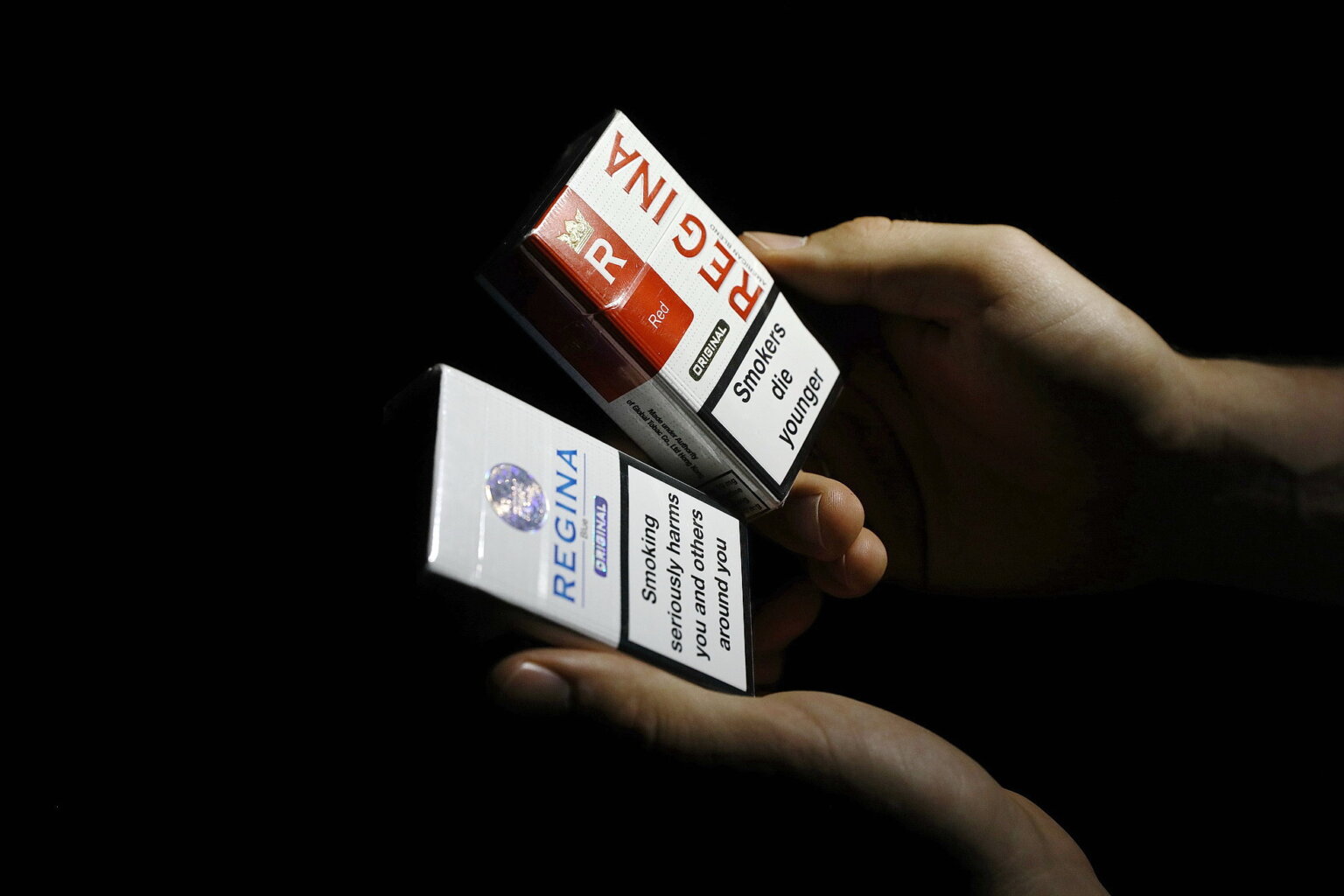
The Regina Blue and Regina Red brand cigarettes with no tax stamps on them, the warning labels in English instead of Ukrainian, and marked “For Duty Free Sale Only” in small letters on the side of the pack are sold illegally in Ukraine. (Oleg Petrasiuk)
Over the past seven years, China Tobacco’s only factory in Europe, a few hours’ drive north of Romania’s capital, has flooded Ukraine with at least half a billion cigarettes. None of the Chinese brands are legally sold there, according to the State Fiscal Service and an association of the country’s largest tobacco producers.
The factory declared it was legally exporting the smokes to 14 different companies in Ukraine, according to Romanian data leaked to OCCRP. But reporters found that at least three of these firms are under investigation for large-scale cigarette smuggling.
Ukrainian law enforcement identified the firms as part of a tobacco trafficking ring that moved large quantities of cigarettes from Romania, Belarus, and the United Arab Emirates into Ukraine — and from there, often into European Union countries.
“This is the basics of smuggling globally,” said tobacco control expert Luk Joossens. “You have international companies who export to locations where the end market doesn’t seem to fit … consumer demand.”
China is a signatory to the World Health Organization’s Illicit Trade in Tobacco Products Protocol, which sets out rules to curb cigarette smuggling and counterfeiting.
A key provision is that tobacco companies must ensure there is legitimate demand for their cigarettes on the local market before exporting. They are also supposed to look into their customers’ backgrounds and make sure they are properly registered and licensed.
China Tobacco, it appears, has been doing neither.
CNTC did not respond to requests for comment. However, its subsidiary in Romania, China Tobacco International Europe Company, said it complied with all relevant Romanian and EU laws and was “continuously improving our risk control measures,” including implementing a “track and trace” system in 2019 to cut down on smuggling.
The company declined to answer questions on its Ukrainian customers and the allegations against them.
Ukraine as a Smuggling Gateway to Europe
Ukraine has long been infamous as a hub for cigarette smuggling, and today it’s still one of the biggest sources of cigarettes smuggled into the EU. Its location on the eastern fringes of the bloc, combined with vastly lower tobacco prices than in EU countries, make it a smuggler’s paradise.
Adding to the lure is the fact that smuggling tobacco, though illegal, isn’t a criminal offense in Ukraine. After years of pressure from the EU to increase penalties, Ukrainian President Volodymyr Zelensky in April introduced a bill that would make smuggling a crime punishable by up to 12 years in prison and a significant fine.
A 2009 exposé by the International Consortium of Investigative Journalists revealed that major cigarette companies had manufactured and imported nearly 130 billion cigarettes the year before — 30 percent in excess of what the local market could consume. These billions of cigarettes disappeared into the market, potentially feeding illicit trade into the EU.
The Ukrainian investigation into cigarette smuggling ran from 2017 until late December 2020, when it was closed because investigators from the State Fiscal Service and Ukraine’s Prosecutor’s Office were unable to identify suspects to prosecute. It was reopened on April 29, a week after journalists asked the prosecutor general’s office for more information on it.
Although law enforcement spent over four years trying to crack the case, they don’t seem to have connected important dots. They also never managed to coordinate with Romanian police, who were looking into the smuggling of China Tobacco cigarettes from their side of the border.
For one thing, after the illegal Reginas were found in Odesa in May 2017, a director of the company that bought them, Duty Free Odesa, swore she had never before brought Chinese cigarettes into the country.
That was untrue. Romanian export data shows that Duty Free Odesa had imported 12.5 million Regina cigarettes into Ukraine just a month earlier, in April 2017, a shipment that apparently went unnoticed by officials. A company with the same owner and director, Travel Retail Ukraine, imported almost 15.5 million Chinese cigarettes in July 2015.
“Ukraine has long been one of the top sources of cigarettes that are smuggled into the EU” – Dr. Allen Gallagher, a researcher with the Tobacco Control Research Group at the University of Bath.
But investigators don’t seem to have looked into this linked firm at all, or to have noticed that the same person owned two companies that were both bringing large numbers of Chinese cigarettes into Ukraine — without a license to import them.

China Tobacco’s only factory in Europe is located a few hours’ drive north of Romania’s capital, Bucharest. Over the past seven years, it has flooded Ukraine with at least half a billion cigarettes.
These blind spots are common when it comes to China Tobacco, OCCRP’s reporting has found. Law enforcement agencies often refer to Chinese cigarettes as “cheap whites” — a term for illegal cigarettes made in smaller production facilities and designed for illegal export — without acknowledging they are produced by the world’s largest tobacco company at a time when it is expanding its international reach.
“Ukraine has long been one of the top sources of cigarettes that are smuggled into the EU,” said Dr. Allen Gallagher, a researcher with the Tobacco Control Research Group at the University of Bath.
“Research has indicated that this is partially a result of major transnational tobacco companies oversupplying the country with product, which then leaks into the EU. Such activities can be hard for authorities to stop given the intricate methods used by smugglers to hide illicit product.”
Straight to the top
Both Duty Free Odesa and Travel Retail Ukraine are co-owned by Vadym Sliusariev, an influential former border official with close ties to Ukraine’s current president. He’s also been gaining a reputation for less savory activities.
In April, former Georgian President Mikheil Saakashvili publicly accused Sliusariev of being “the main smuggler of the Kharkiv region,” referring to an area on Ukraine’s northeastern border that is known as one of the country’s key smuggling routes.
“Why is he not on the list?” asked Saakashvili during a television appearance in Ukraine — where he became a citizen in 2015 and briefly served as the governor of Odesa — referring to a recent announcement of sanctions against alleged smugglers. Perhaps, he continued, Sliusariev had “some sort of immunity because of his political sympathies.”
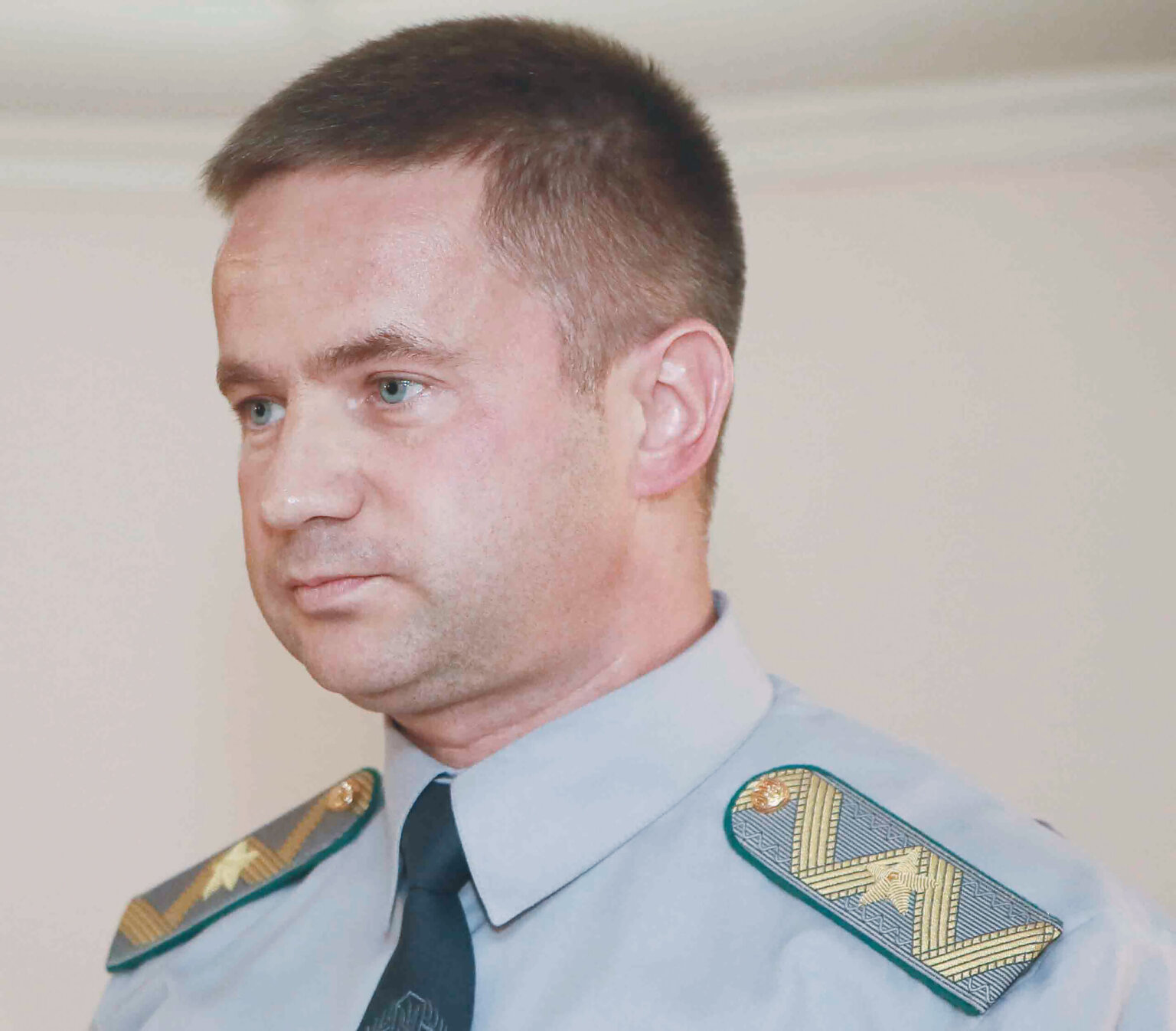
Vadym Sliusariev, a well-connected former border official with ties to Ukrainian President Volodymyr Zelensky. (dpsu.gov.ua)
Sliusariev has close ties to President Zelensky, whom he began working for after retiring in 2015 as head of the State Border Guard Service’s Department of Internal Security. Before that, he’d spent years working in various State Border Service departments in the Kharkiv region.
Investigators working on the smuggling case stressed to a journalist that they had no evidence Sliusariev was personally involved, even though his companies were. Sliusarev became a co-owner of the two companies between 2017-2018 after they had already gotten involved in smuggling. The other co-owner, Ksenia Yablukovska, acquired shares in the two companies back in 2015-2016 while they imported China tobacco cigarettes to Ukraine.
Sliusariev’s companies did not respond to requests for comment. Attempts to reach him through the Servant of the People party were also unsuccessful.
Vadym Sliusariev, Servant of the People?
In 2019, Sliusariev became an election organizer for Zelensky, a former television star who played a president on television before taking on the role in real life.”
At first, his involvement with Zelensky’s party, Servant of the People, was kept quiet, for reasons that remain unclear. Local media outlets made the connection in a story exposing him as what they called a “shadow curator” of Zelensky’s team in eastern Ukraine’s Kharkiv region, helping drum up votes for the 2019 parliamentary election.
The Ukrainian RFE/RL radio program “Schemes” went on to uncover links between Sliusariev’s businesses and four of the party’s candidates for parliament. Another media outlet, Censor.Net, also revealed that Sliusariev was reportedly running two hotels in Crimea and had flown there via Russia, in breach of Ukrainian legislation.
None of this seemed to damage Sliusariev’s burgeoning political career. Eventually, Zelensky publicly confirmed to RFE/RL journalists that Sliusariev worked with Pavlo Sushko, the head of the president’s electoral headquarters in Kharkiv. Sliusariev and Sushko served together in the State Border Guard Service.
After the elections, Sliusariev started to emerge from the shadows. First, he became a freelance adviser for Serhiy Trofimov, the first deputy chief of Zelensky’s office. As of now, Sliusariev is no longer employed by Zelensky’s office, the president’s press service told the Kyiv Post. Then, in March, he was appointed to a newly created Political Council to develop political strategy for Zelensky’s Servant of the People party. The party did not respond to a request for comment.
While Sliusariev officially became the co-owner of the two companies after they got involved in cigarette smuggling, their rise marched in step with his career at the Border Guard.
In 2012, Travel Retail Ukraine opened a duty free shop at the Hoptivka checkpoint along Ukraine’s border with Russia. At the time, Sliusariev was serving as head of the internal security of the Eastern Regional Department of the State Border Guard Service which manages over 40 crossing points across Ukraine’s border with Russia, including the Hoptivka checkpoint.
In 2017, after retirement, Sliusariev became the co-owner of Travel Retail Ukraine. The same year, he also bought a company called Frontera that owns a building located next to the Hoptivka checkpoint and rented it out to the Kharkiv Border Detachment that does not have its own, the RFE/RL program, Schemes, found out.
According to the reporters, this Sliusariev’s company also owns land plots next to the Hoptivka checkpoint, which now houses grocery stores and insurance points.
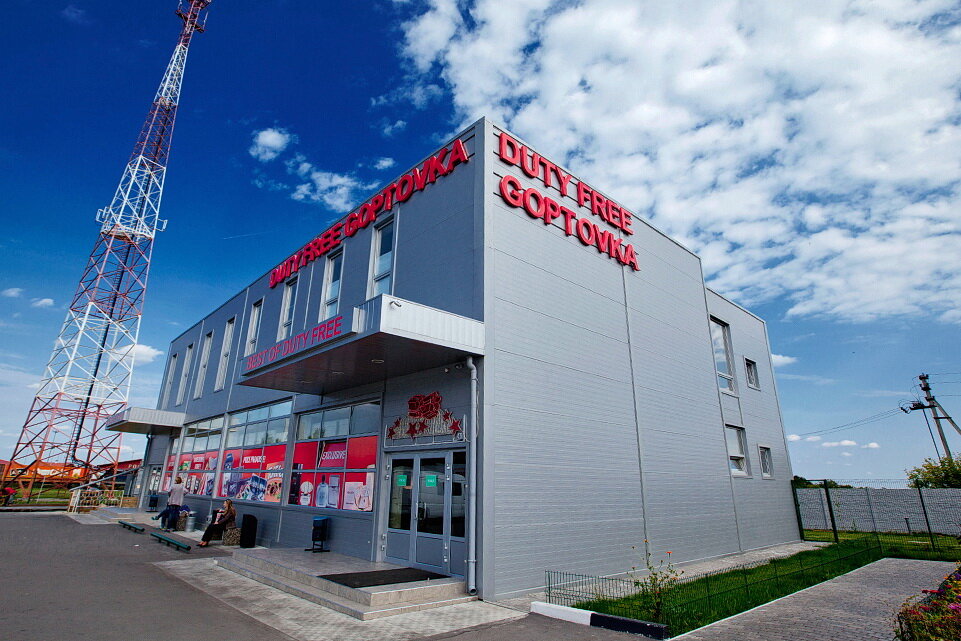
Hoptivka checkpoint is located in the Kharkiv Oblast on the Ukraine-Russia border. Photo by http://dutyfreeunite.com/
Although OCCRP and the Kyiv Post has not uncovered evidence that Sliusariev used these shops for smuggling, the cigarettes confiscated in the 2017 Odesa bust were marked “for duty-free sale only” — a common ruse for getting contraband cigarettes into Ukraine, according to a 2020 study by KANTAR, a data analytics and brand consulting company.
A detective who investigated the shipment said it was clear the smokes were never intended to be sold in a duty-free shop. He spoke to the Kyiv Post and OCCRP on condition of anonymity because he is not authorized to talk to the media.
“Duty-free shops, they do not sell such cigarettes,” he said, explaining that shoppers in these stores wanted higher-end brands. “Why duty-free? Because it is customs-free. They are like, ‘We are buying for ourselves.’ But they do not sell these cigarettes.”
“These cigarettes, because they are much cheaper, are more profitable to sell to smugglers for cash. They will then ship them abroad, to Poland, Hungary, Romania, and so on” – Kostyantyn Krasovsky, head of the tobacco control department of the Institute for Strategic Studies of Ukraine’s Health Ministry.
Kostyantyn Krasovsky, head of the tobacco control department of the Institute for Strategic Studies of Ukraine’s Health Ministry, explained that official oversight of duty-free shops is “very, very weak” in Ukraine, making them an ideal conduit for smuggling cigarettes.
“On the books, these cigarettes will be sold — there will be a report on that,” he said of the schemes. “But, in fact, these cigarettes, because they are much cheaper, are more profitable to sell to smugglers for cash. They will then ship them abroad, to Poland, Hungary, Romania, and so on.”
They might also stay in Ukraine and be sold on the black market.
Reporters found multiple packs of Regina cigarettes for sale at tobacconists around Ukraine and online, marked for “duty-free sale only.” All appear to have been imported by a man who had partnered with Duty Free Odesa in May 2017, a Georgian businessman living in Odesa named Turki Khalaf.

The Regina Blue and Regina Red brand cigarettes with not tax stamps on them, the warning labels only in English instead of Ukrainian, and marked “For Duty Free Sale Only” in small letters on the side of the pack are sold illegally in Ukraine. Photo by Oleg Petrasiuk.
It was Khalaf’s company, Global Tobac Co, that served as the supplier for the 2017 shipment of Reginas intercepted in Odesa. A man named Maksym Khalaf, who uses the same address as Turki, owns yet another tobacco import firm, Empire Tobacco, which purchased over 66 tons of raw tobacco from China Tobacco’s company in Romania in 2019 and 2020.
Some of the illegal cigarettes encountered by reporters bore the logo of Empire Tobacco and a small label on the side of the packs reading, “Made under authority of Global Tobac Co., Ltd Hong Kong.”
Khalaf did not respond to requests for comment.
The Batumi manoeuver
While it’s unclear what Duty Free Odesa was going to do with the smuggled Reginas that were intercepted in 2017, the company seems to have been tipped off by customs officials about the bust.
By the time detectives from Ukraine’s State Fiscal Service arrived at the border post that day in May with a search warrant, the company’s director, Yulia Tymoshenko, had found a way to escape blame — in the nick of time.
She emailed a letter formally rejecting the shipment and redirecting the cigarettes to a Canadian company, which would supposedly import them to the Black Sea port of Batumi, in Georgia, according to court documents.
This sent detectives on a wild-goose chase. The Canadian company denied any knowledge of the shipment. The absence of a recipient meant there was nobody to hold accountable for the smuggled smokes.
“We had no suspects,” said detective Yan Strelyuk, who worked on the case.
The State Fiscal Service detectives were also waylaid by agents from the State Security Service, who arrived when they opened the truck and demanded to know what they were doing, according to the detective source who spoke on condition of anonymity. Odesa Customs then refused to share key documents for the investigation, so the detectives had to petition a judge so they could continue working. (The judge agreed and ordered them to be handed over.) State Security Service denied accusations.
When the detectives finally obtained the documents, they revealed that Tymoshenko’s signature on the refusal letter had been faked.
Tymoshenko “supposedly had a contract with a director of China Tobacco, the contract with the Chinese. But the signatures were different on the refusal letter and on the contract,” said the detective on the case, who spoke on condition of anonymity.
Reporters went to Dnipro, a city in Ukraine’s central steppes where both Duty Free Odesa and Travel Retail Ukraine are registered. There was no sign of official business activity at the apartment building where they’re officially registered — not even a nameplate. A man who opened the door declined to answer questions.
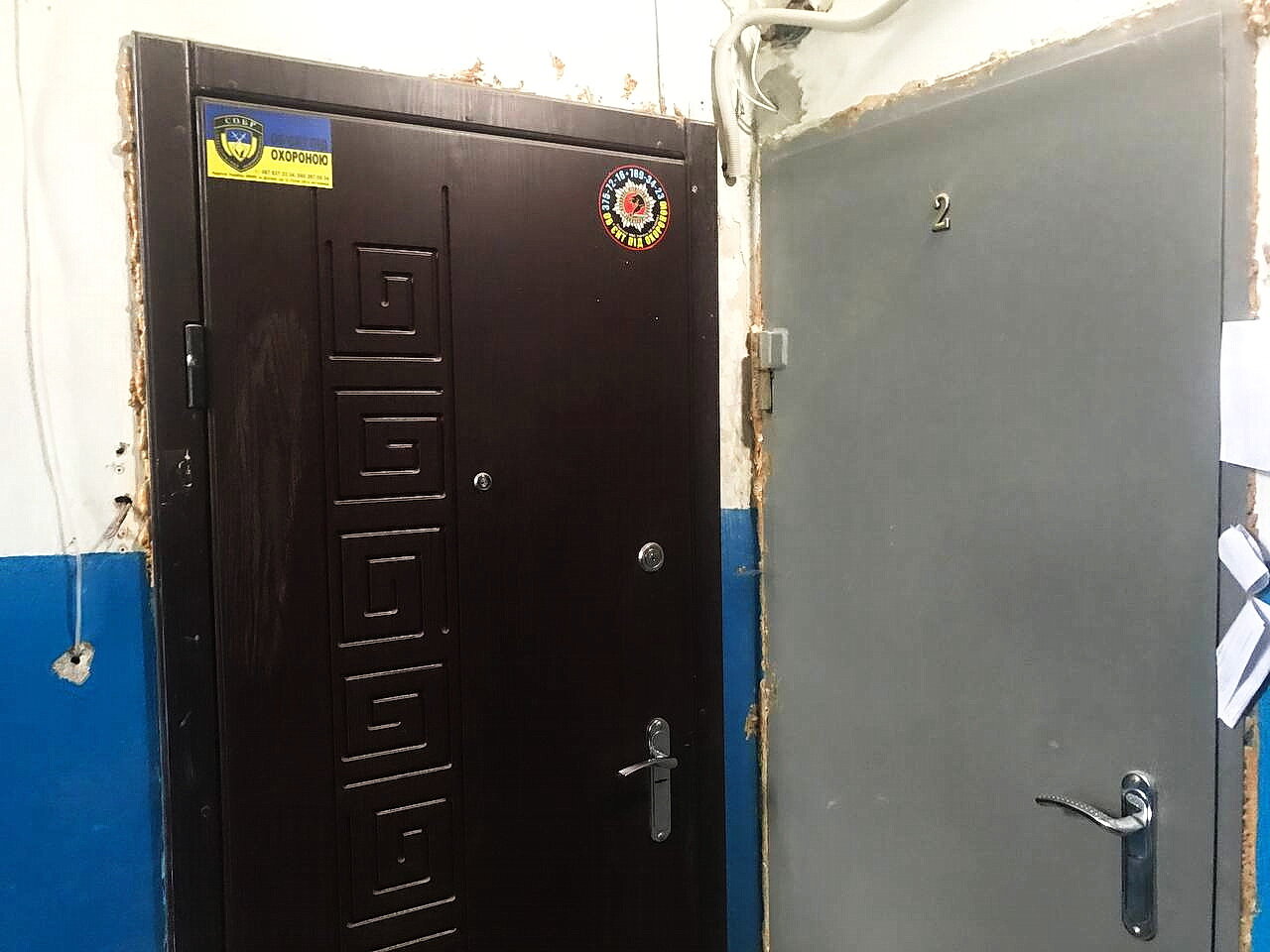
Both companies Sliusariev co-owns, Travel Retail Ukraine and Duty Free Odesa, are registered in an apartment house in central Dnipro. There is no sign plate on the building or the apartment door indicating that any firm operates there. Photo by Kyiv Post.
Neither Yulia Tymoshenko nor the companies’ co-owner, Ksenia Yablukovska, were at home when the Kyiv Post visited. They did not respond to multiple attempts to reach them for comment. The State Security Service also did not respond to a request for comment.
In the end, the shipment of Reginas was destroyed. But it was only a drop in the ocean of Chinese cigarettes flowing into Ukraine.
Companies in Occupied Territories
Between 2014 and 2020, hundreds of millions of Regina, D&B, and Dubao cigarettes made at China Tobacco’s European facility were shipped to two Ukrainian companies that didn’t hold licenses for tobacco import or distribution.
Both were investigated as part of the same smuggling case that Duty Free Odesa was caught up in. Investigators suspected them of being “used as buyers or carriers” to move Chinese cigarettes into other countries.
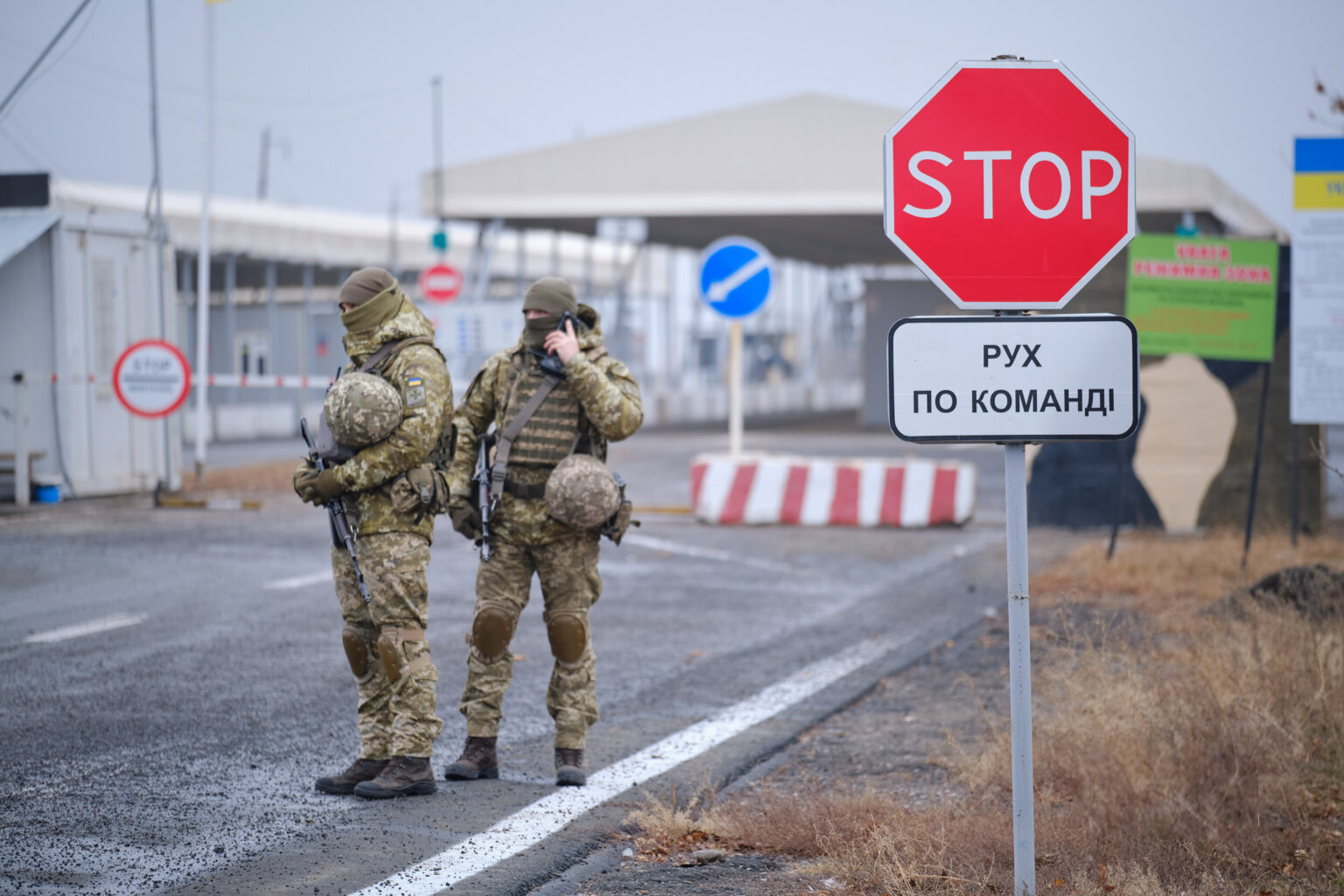
Servicemen of the State Border Guard Service are standing at the Novotroyitske cross frontline entry point, some 45km south of the Russia-occupied Donetsk. (YEVGEN HONCHARENKO)
It’s hard to trace what happened to those cigarettes after they entered Ukraine since they weren’t sold through legal avenues. But seizures of China Tobacco brands in Italy skyrocketed starting in 2016 — and many of them arrived from Ukraine.
Between 2017 and 2019 around 41 metric tons of contraband Regina, D&B and Dubao cigarettes were seized in Italy, 17 percent of which could be sourced to Ukraine, according to data provided to OCCRP by Italian tax police.
Ukraine was already a hotbed of cigarette smuggling before hostilities broke out with Russia in 2014, but the situation deteriorated even further after that — especially in the occupied regions, where both of these suspicious China Tobacco customers were based.
The biggest single buyer, a company called Rivera Grand Ltd., is headquartered in Crimea. Rivera Grand imported the majority of the Chinese cigarettes it purchased in the chaotic months after Russia annexed the Crimean peninsula — 200 million in 2014 alone. Some were labeled “for duty free sale only.”
Rivera Grand and Motor Sich
One of Rivera Grand’s shareholders, a man called Oleh Polishchuk, is involved with a firm that has been caught up in one of Ukraine’s biggest ever controversies over Chinese influence.
He is the co-owner of Motor Sich Trade, a subsidiary of one of Ukraine’s largest strategic defense firms, Motor Sich. In 2015 a Chinese state aviation company signed a memorandum of cooperation with Motor Sich which included some technology transfers from Ukraine to China, sparking a massive backlash.
Ukraine’s State Security Service ultimately blocked an attempt to sell a majority stake in the company to the Chinese firm. In March 2021, Kyiv seized control of Motor Sich and said it would be nationalized. Motor Sich didn’t respond to a request for comment on its ties to Polishchuk.
The other buyer, Doninvest-99, is based in Donetsk, the biggest city in the Russia-backed breakaway territory of Donbas, where an armed conflict between Russia-backed separatists and Kyiv loyalists has ground on since March 2014.
Ukraine brought in legislation the following year requiring companies registered in Crimea and Donbas to relocate to Kyiv-controlled territory so they could legally operate and pay taxes. Neither Rivera Grand nor Doninvest-99 did so. (Journalists could not reach either company for comment.)
Companies registered in the occupied part of Donbas are considered by Ukraine’s Central Bank to be at high-risk of money laundering, while Crimea is under U.S. and EU sanctions that forbid selling strategic materials like chemicals and iron to companies based there.
Cigarettes are not on the banned list, so it’s not technically illegal to sell them to Crimean companies, but “it is risky for a few reasons,” said Mykyta Petrovets, a lawyer with Ukraine’s Helsinki Human Rights Union.
“First, this company could be involved in supplying goods to Russia and this could lead to sanctions, and they could lose their money as a result,” he said.
“There can be a number of problems and obviously it is a bigger risk than trading with an ordinary Ukrainian company,” he added. “Lawyers would certainly say: ‘look, this is a Crimean company, there are risks’.”
Who will help the Gurkhas now? Thousands of Nepalese came to Afghanistan to work for Westerners and were forgotten there
When the Taliban captured Kabul on August 15, 2021, a group of thirteen men on the fifth floor of the Roshan Plaza hotel in the city center hatched a daring plan. They decided that if the hotel were to be searched, they would tell the Taliban that they were tourists from Nepal. The 13 men were lucky – the Taliban never came to the hotel, even in the days following the overthrow of the Western-backed government. And so they continued to sit there, as they had been sitting there for months: four of them to a room, effectively trapped. The hotel’s security guards had been instructed not to let them out on the street. They weren’t even allowed to show their faces in the lobby. In fact, these men from Nepal were not tourists. They had come to Afghanistan in the middle of the war because they had been promised jobs as guards at the German Embassy.
The men on the fifth floor were Gurkhas, a collective term for Nepali soldiers. When the English tried to invade Nepal in the 19th century, the Gurkhas resisted so relentlessly that the British established their own Gurkha regiments after the war. They recruited young men in Nepal’s mountain villages and sent them off to fight wars that had nothing to do with them.
Nearly half a million Gurkhas fought in World War I and II. They fought and drowned in the trenches of France, which were dug for larger men. They helped liberate northern Italy from the Nazis, and the British Army awarded them medals of valour for their efforts. At home, however, they did not receive so much as a pension.
It seems to be the fate of these quiet soldiers that their contributions are forgotten. In France, in northern Italy, and now in Afghanistan.
In Afghanistan, Gurkhas served as guards at a number of Western embassies and other facilities. According to some estimates, more than 35,000 Nepalese have worked as guards in Afghanistan over the past 20 years, but the number is likely to be higher. Many of them were victims of human trafficking. When Kabul fell on August 15, some were simply left behind. Here, they share their stories for the very first time.
Sweating towards a new life
To understand the Gurkhas better, it helps to go into the hills where they become Gurkhas. It is early morning in Pokhara, Nepal’s second-largest city, and upon the hill, the morning haze is mixed with the panting of young men. They are doing interval runs, sprinting up the slope sometimes as much as ten times in succession. Today, around 30 young men are charging upward, perhaps towards a better life.
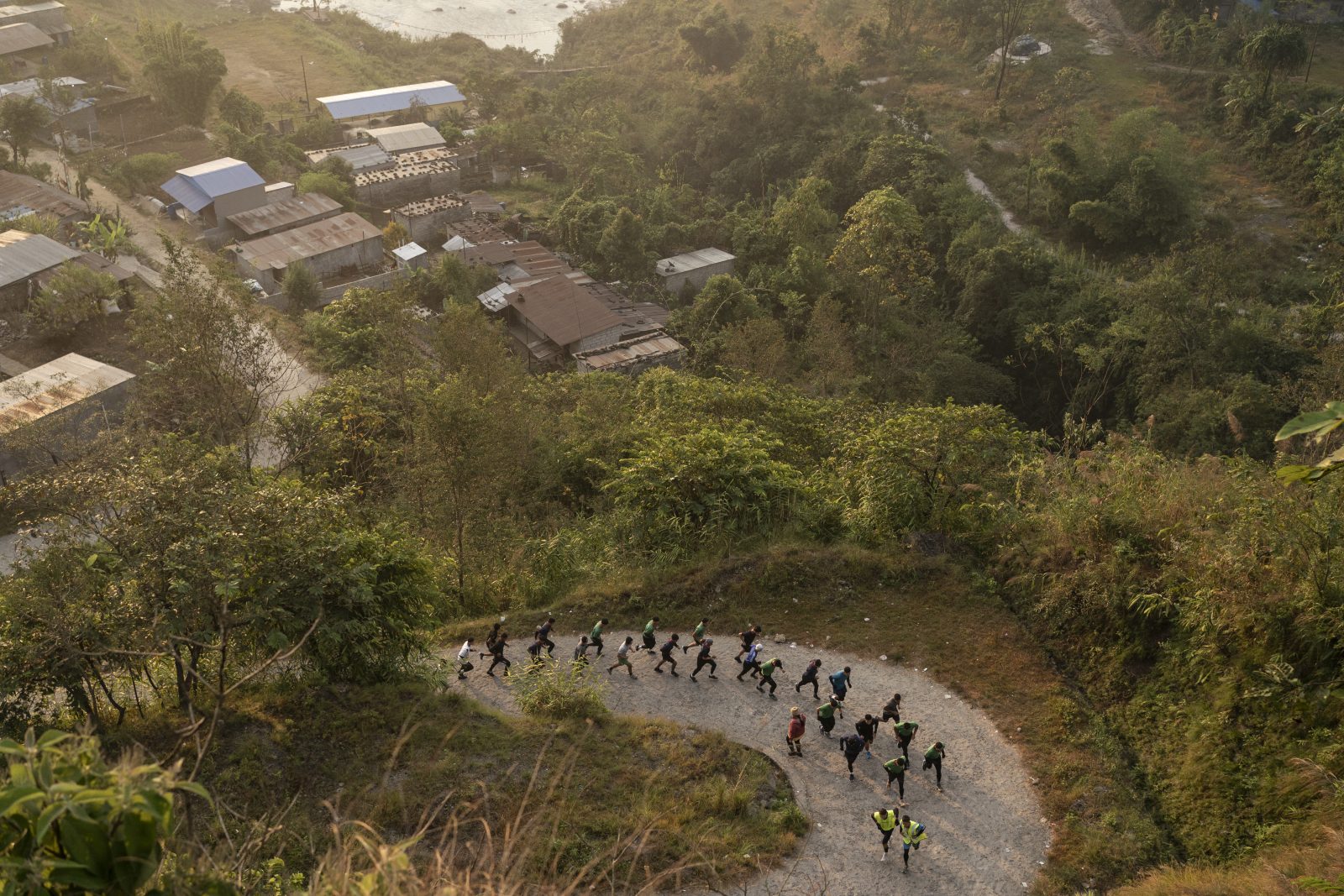
A morning workout on the hill: Young men running, perhaps towards a better life.
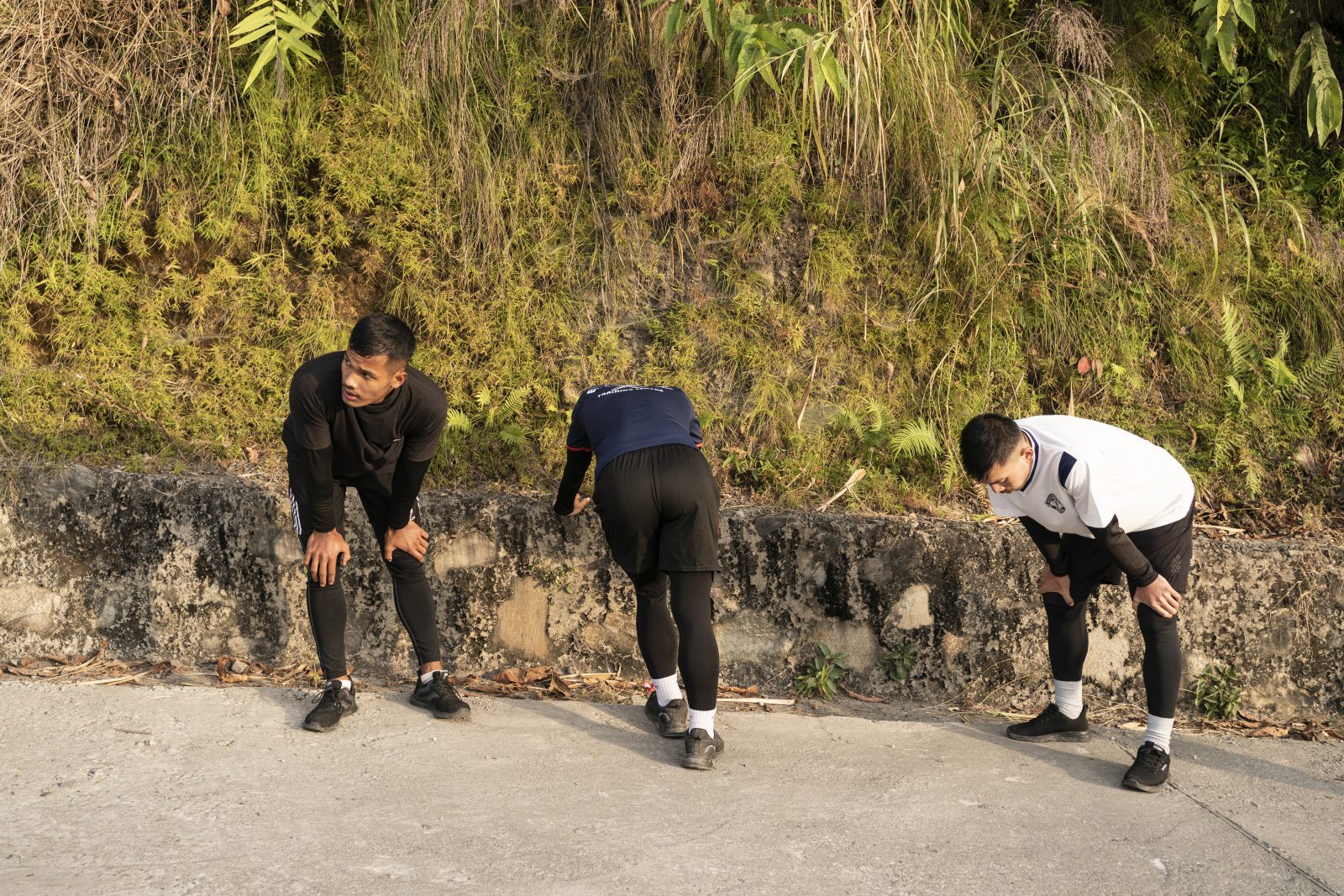
Sweating and panting, with the goal of one day becoming a Gurkha.
Ajit Fewali Magar is 20 years old, and for him, the selection process will take place in just a few days. Why does he want to become a Gurkha? “I want a rewarding and long career. If necessary, I would like to prove my blood and courage on the battlefield. And I want to improve my family’s financial circumstances.” Magar has memorized these sentences in English. He looks as though someone has screwed a boy’s head onto a broad man’s shoulders.
Magar is training at one of the private Gurkha training centres in Pokhara. There, day after day for a period of six months, as many as 300 young men at a time rehearse the tasks that will one day be asked of them during the recruitment process: pull-ups, exercises involving running while carrying weights as well as ordinary endurance running, but also English and mathematics.
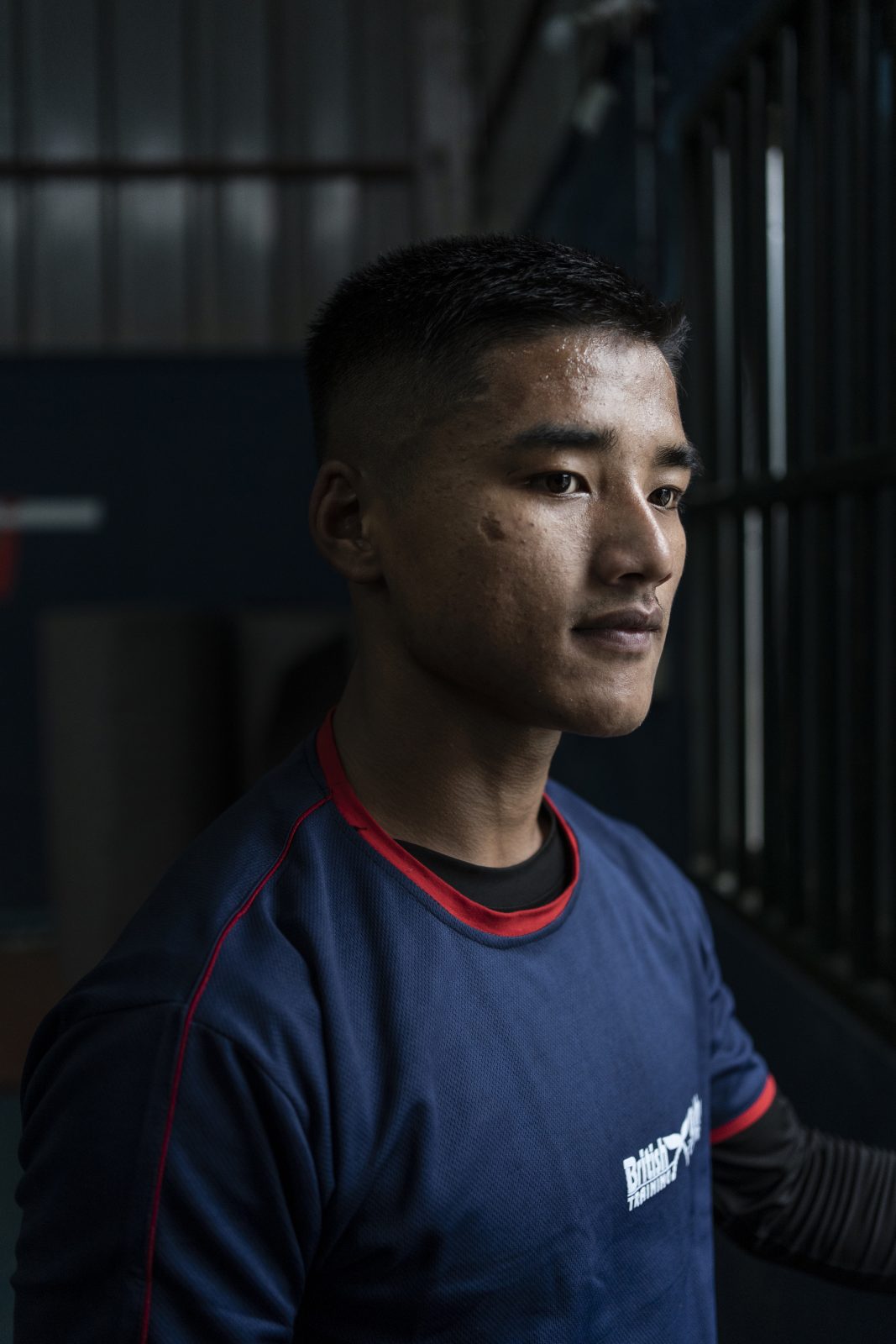
Ajit Fewali Magar applied to join the Singapore Police Force.
The British army comes to Pokhara to recruit new candidates once a year. Several thousand men apply but only 200 are accepted. Those who have served receive a residence permit in Great Britain. Magar is, instead, trying out for the Singapore Police Force, the city-state’s national law enforcement agency. This is his only chance: afterwards, he will be too old to apply. The Singapore Police Force also recruits Gurkhas as does the Indian army. Those not chosen by the British might make it to the Singaporeans. The Indians take the most recruits but pay less. Only recently have the young men also applied to join the Nepalese security forces.
The instructor is not satisfied with Magar’s English answer. Most applicants fall short during the interview with the recruiting officer, he says. Many of the young people at the training centre say they want to become Gurkhas in order to earn money. They come from peasant families and soldier families. Many have a father or an uncle who previously served as a Gurkha. The instructor wants them to talk about courage and loyalty instead. The motto of the Gurkhas, after all, is that it is better to die than to be a coward.
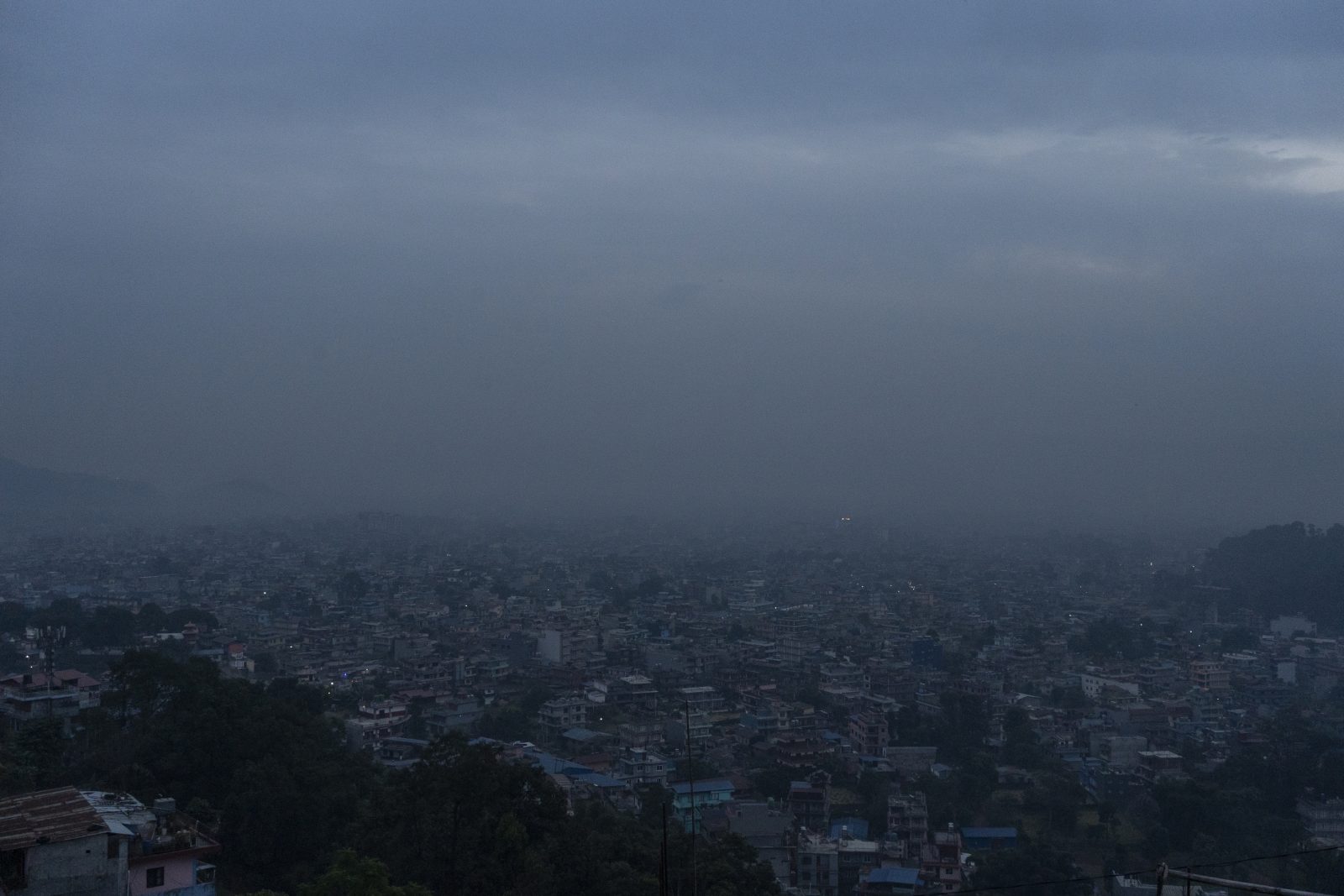
Pokhara is Nepal’s second-largest city. This is where Gurkhas are recruited.
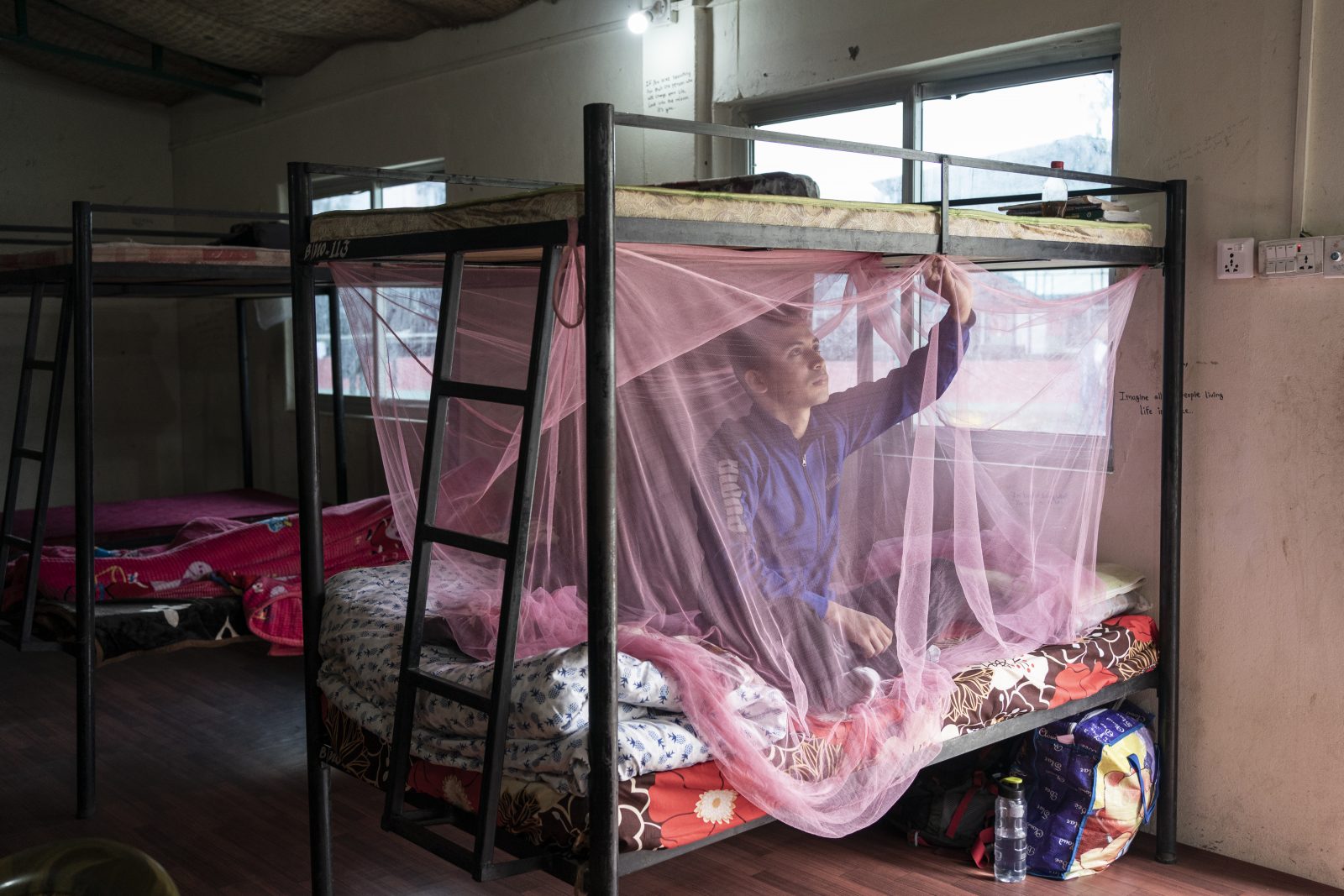
Aspiring Gurkhas live in simple rooms. Here, Akash Poudel shows off his bed.
Magar’s father is a farmer from a village in the Gurkha district, which once gave its name to the Gurkha forces. Nepal’s first king set out from Gurkha, ultimately unifying the territory with his fearless fighters. “I helped on the farm, four to five hours a day. That was my training,” Magar says. One of his tasks, he adds, was to carry heavy baskets up and down the hills. This is the Gurkha legend, that the sons of Nepal’s mountain farmers become the toughest and bravest soldiers.
You can see young men running and sweating in many places around Pokhara. The city is home to numerous training centres. Magar is paying roughly $490 for six months of preparation, including room and board. His family, which lives many hours away by bus, had to scrape together the money. Trying to become a Gurkha means the entire family’s hopes and worries rest on Magar’s broad shoulders from a very early date.
There are thousands of young men like Magar who become Gurkhas every year. And each year, after their service is done, thousands leave the British, Indian, and Nepalese armies, knowing nothing beyond the life of being a soldier. In the end, their families’ hopes and worries end up driving many of these veterans to Afghanistan.
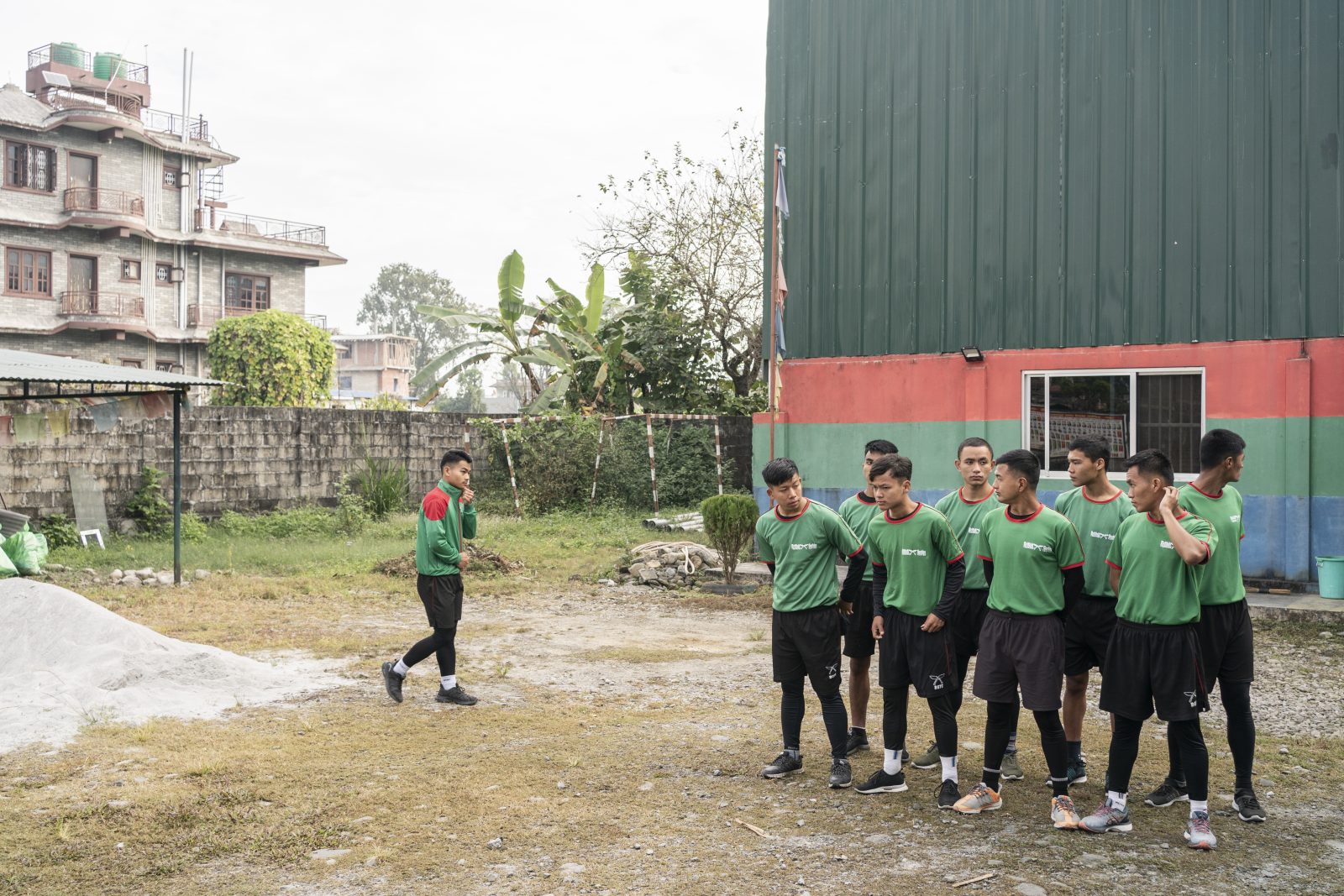
Training starts early in the morning. The young men here are getting ready for their first workouts.
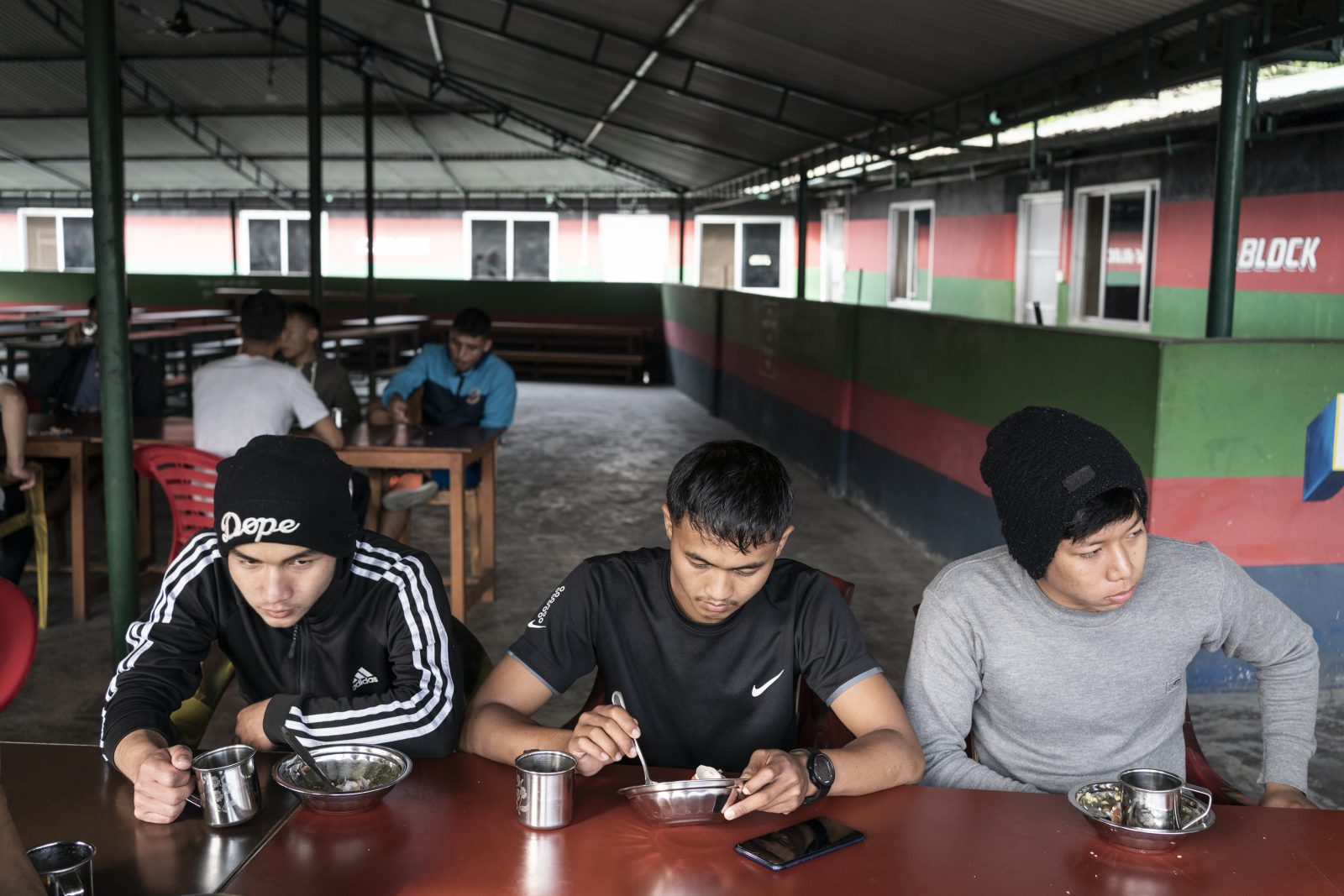
Breakfast is served after the first training session. The young men pay around $490 for half a year’s training.
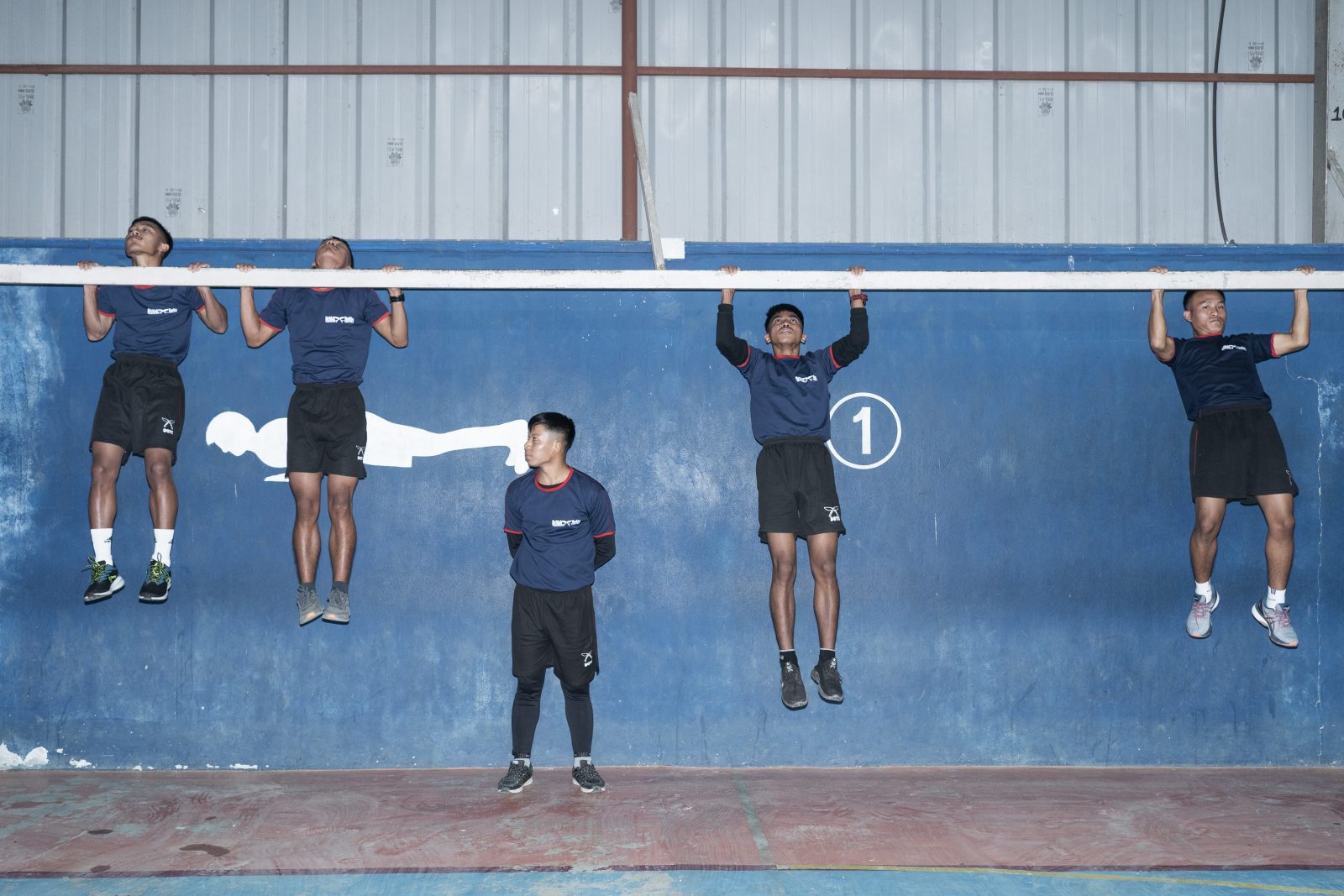
Pull-ups, over and over. The aspiring Gurkhas practice for the tests they’ll face on recruitment day.
Outsourced guard services
Even during wartime, the fighting is not constant. In Afghanistan, the violence came in waves. The Taliban mounted spring offensives against NATO troops, the fighting continued throughout the summer, and then in the fall, when the temperatures plunged, the active conflict subsided. There is, however, a constant need for guards during wartime. Armed guards stand guard outside every facility in Afghanistan used or occupied by international delegations. Hardly any embassies want their own soldiers on duty at these guard posts. It is a boring and dangerous task, and the guards are usually the first victims of attacks. Thus, embassies outsource the job to private security firms.
One of these companies is owned by Ian Douglas Gordon. He named the company after his initials, IDG. He currently employs more than 500 Nepali Gurkhas in Afghanistan. In Kathmandu, Gordon offers a rare glimpse into a secretive world where individual men command small private armies. And lest anyone think that this demimonde is inhabited only by tattooed Rambos, Gordon is a 72-year-old tie-wearing Briton who is never at a loss for a quote from The Art of War, the book written around 500 B.C. by Chinese general Sun Tzu.
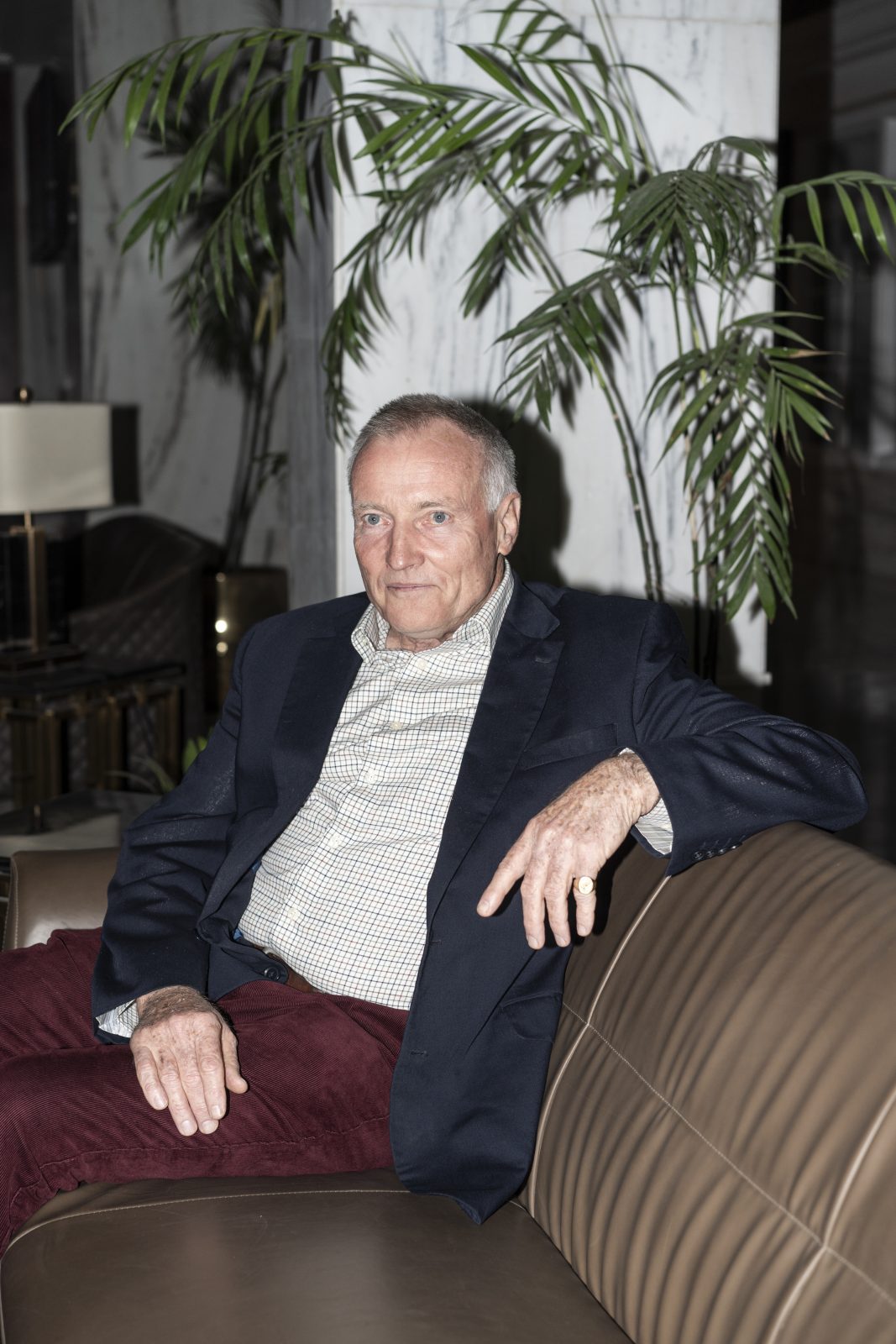
Ian Douglas Gordon owns the security firm IDG. In effect, that means he commands a small private army.
Gordon’s Gurkhas have guarded United Nations buildings across Afghanistan. When Kabul fell, they stayed in place. The Taliban sent negotiators to the capital, and in the end, there was no violence, so the U.N. was allowed to stay in Kabul. One Gurkha says they would have been ready to fight.
IDG does not guard embassies in Afghanistan. “The exploitation of the Nepalese is taking place through some of these embassies,” Gordon says. If an embassy needs security guards, it solicits quotes from private security companies. Many of the bids that are put out require guards to work 12-hour shifts; IDG, however, offers a maximum of two four-hour shifts a day, and ideally even less.
“How many Europeans would stand there for 12 hours a day?” Gordon asks. In most cases, the cheapest bid wins the contract. Often, the guards wind up being Nepalese Gurkhas. Gordon says customers don’t care how long the Gurkhas are at their posts, even in inclement weather or snow. They’re just Asians, the thinking goes. “Let me be very clear about this: It’s racist. No one would treat a Westerner like that and get away with it. But it’s not written about in the West, and no one cares.”
Gordon’s life has followed a path that would be largely impossible today. His father ran a tea plantation in India and interrupted his business to serve in World War II. The family remained in India even after the country became independent. As a child, Gordon spoke Hindi and Nepali to the workers on the plantation. Before founding IDG, he was an officer in the British army and commanded a Gurkha regiment. He has extremely high praise for the Gurkhas, and views them as his brothers in arms. They are always respectful, he says, no matter what part of the world they serve in.
IDG currently places Gurkhas in Afghanistan who have previously served in the Indian army or the Singapore Police Force. Gordon personally recruits them in Kathmandu. All have already served for years but want to supplement their pensions. A Gurkha can earn around $1,000 per month in Afghanistan.
Among the ex-soldiers in Afghanistan, there is a clear hierarchy. The most expensive come from the English-speaking West: the United States, Canada, Australia, New Zealand and Great Britain. Then come the Eastern Europeans and the South Americans, who make about $3,000 a month. Then there are the Africans and the Nepalese. The cheapest are the Afghans. But hardly anyone trusts, a former commander of the guards for the Canadian embassy says, as some could have turned out to be Taliban sleeper agents.
Noah Coburn is an American professor who has written a book entitled Under Contract on the role of private security forces in Afghanistan. In an interview, he says the price pressure on private security firms has increased in recent years. “The more international troops left the country, the more difficult it became for the security people,” he says. As the date of withdrawal approached, embassies caught in the midst of the hopeless war began trying to economize.
Some security companies started working with human traffickers to meet the demand.
Around 1,500 Nepalese leave their home country every day. A 2010 survey, the most recent on the issue, indicated that one-quarter of Nepal’s residents were living below the poverty line. Job opportunities were scarce. After their army service, Gurkhas are often recruited by agents from firms with names like Worldnet Human Resources Manpower. But in fact, these are facades for empty promises. You can try to find these companies in Kathmandu’s winding alleyways. But empty promises are easy and fleeting, and when you visit the address on the business card, you are likely to find only a neighbour who will tell you the agency has long since moved on.
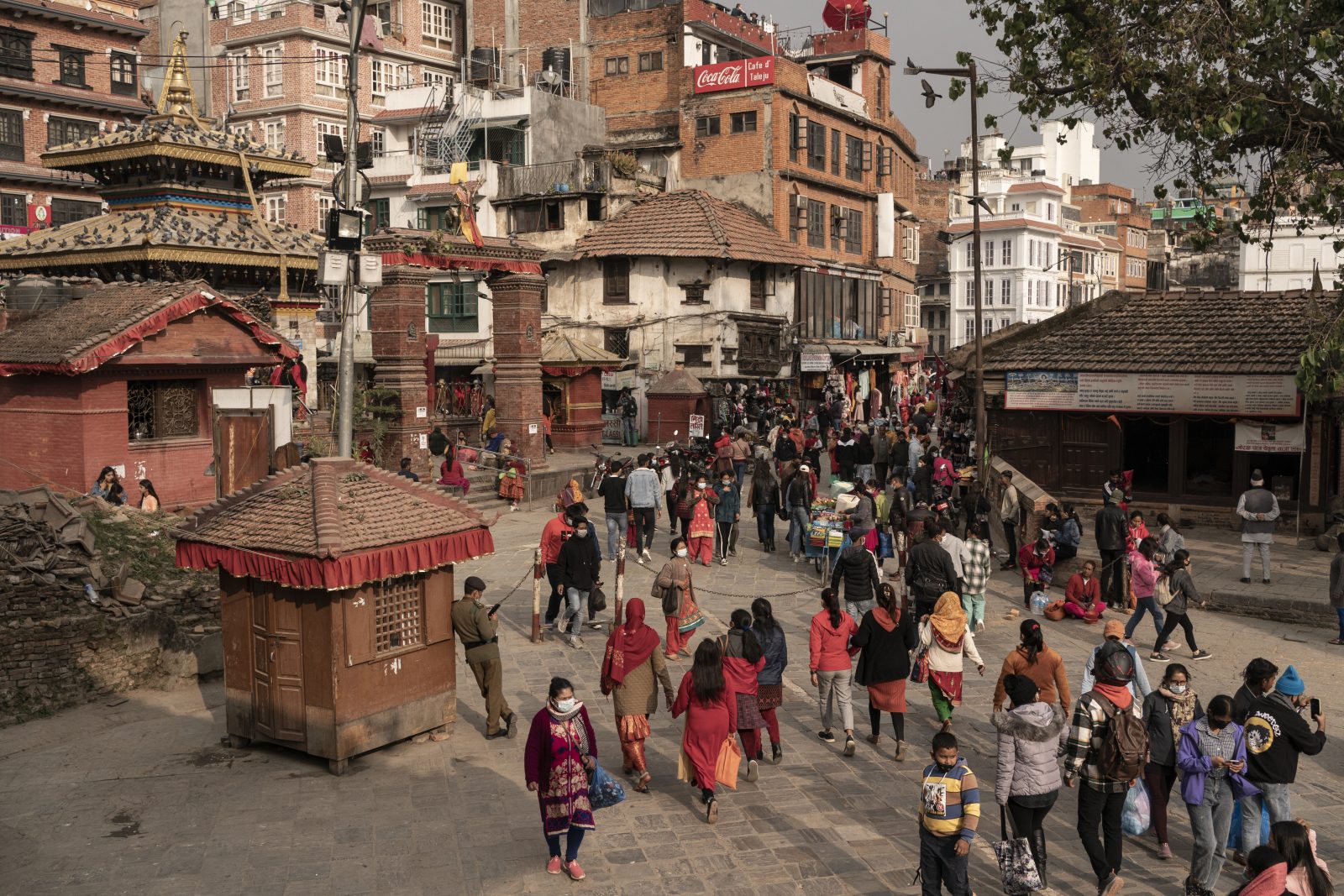
The famous Durbar Square in Kathmandu.
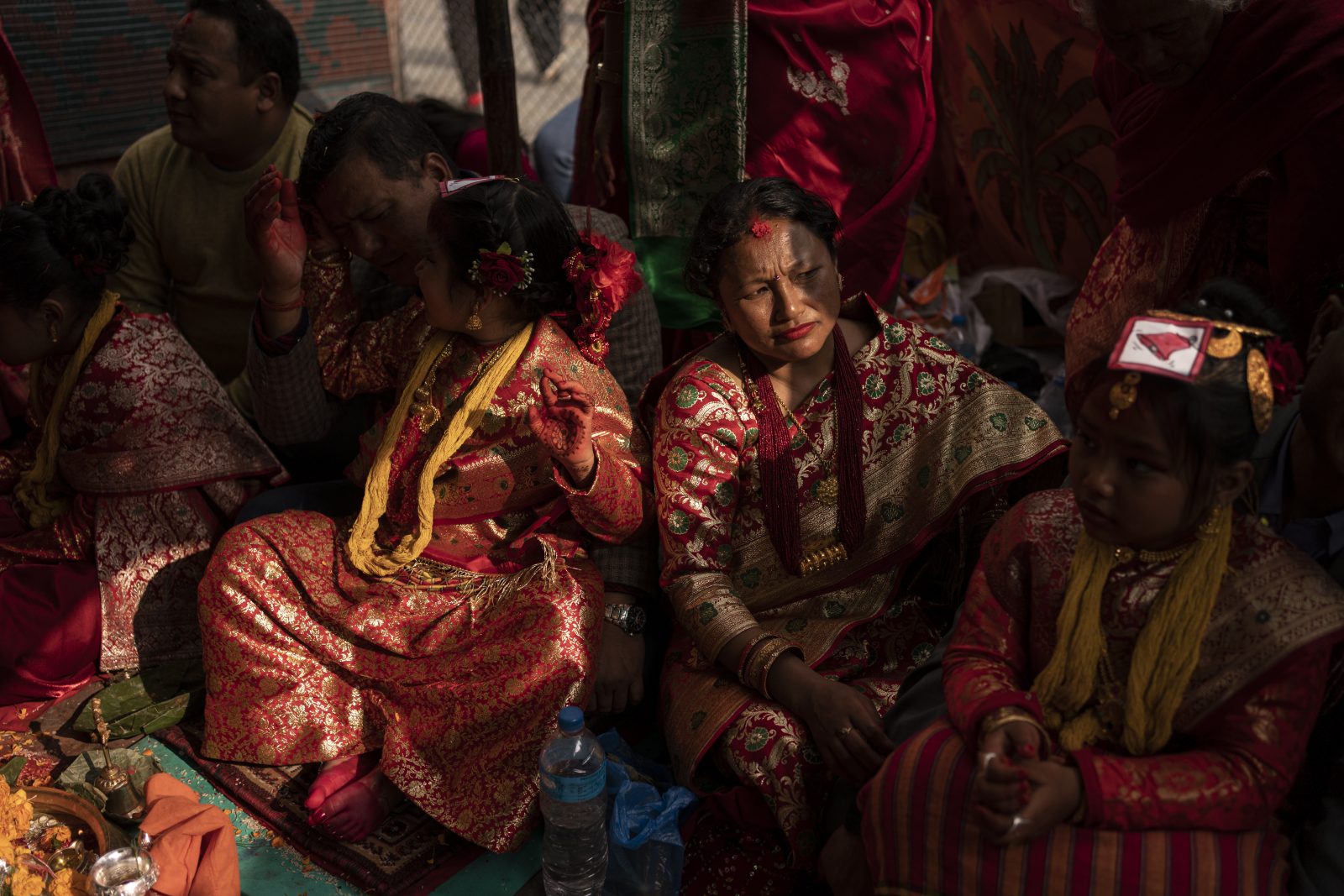
Nepalese people celebrate religious festivities in Durbar Square.
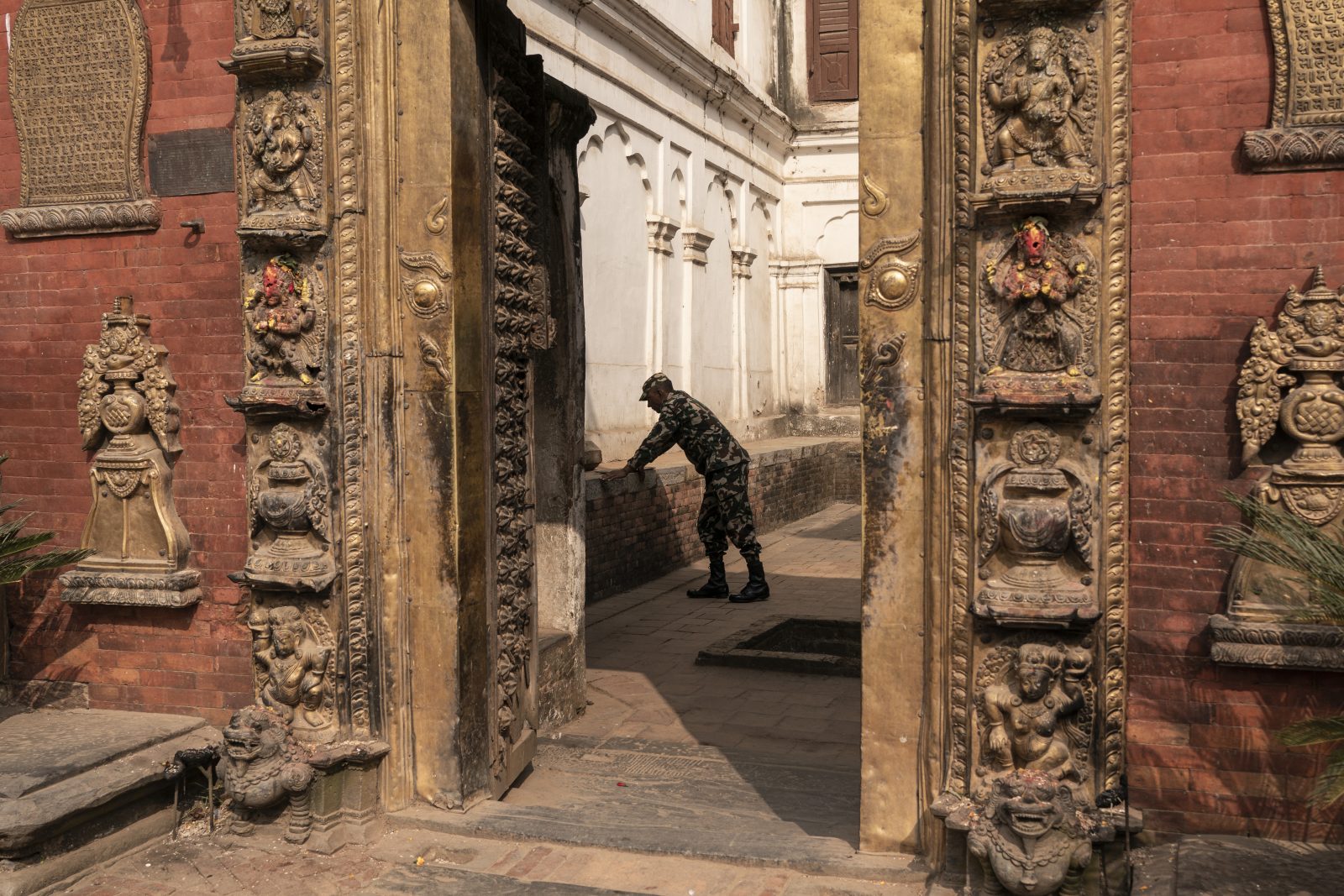
A soldier guards the Durbar Temple in Bhaktapur, in the Kathmandu Valley.
The agents smuggle the Gurkhas into Afghanistan. There, they are recruited by one of the security companies. For these firms, this is cheaper than going to Kathmandu on their own. They do not need staff on the ground, do not incur travel expenses and do not need visas. That helps lower prices. In recent years, agents have directed a steady stream of Gurkhas into Afghanistan. Those who aren’t immediately signed to a contract end up on waiting lists, or in some cases have simply been stranded in Kabul. “It’s a modern-day slave trade,” Gordon says, explaining that the Gurkhas work for free their first year with all their wages going to the agents.
On August 28, 2021, Gordon’s company rescued 34 stranded Gurkhas from a Sikh temple in Kabul. After they had gathered there, the Taliban presented them with an ultimatum, ordering them to leave the temple and the country. The Nepali Embassy in Delhi subsequently asked Gordon to take in the stranded people. Among the 34 were the 13 Nepalese who had been hiding together on the fifth floor of the Roshan Plaza hotel.
Reputation is more important than money
The 34 have never before spoken with a journalist about what happened to them. Most want to remain silent. When contacted, they hang up the phone, turn it off or hand it off to their wife. However, two of them, Dawa Gurung and Kumar Rana – not their real names – finally agree to talk. We meet in Pokhara as they do not want foreigners to visit them in their villages. We sit at the lake. The first tourists are back in Nepal, and a boy is selling balloons nearby. Rana says he has told only his immediate family what happened in Afghanistan. He is afraid of losing face if the neighbours find out that he came home empty-handed when he was supposed to bring home money. “My reputation is more important than the money,” he says. The Gurkhas are victims, and yet they are ashamed.
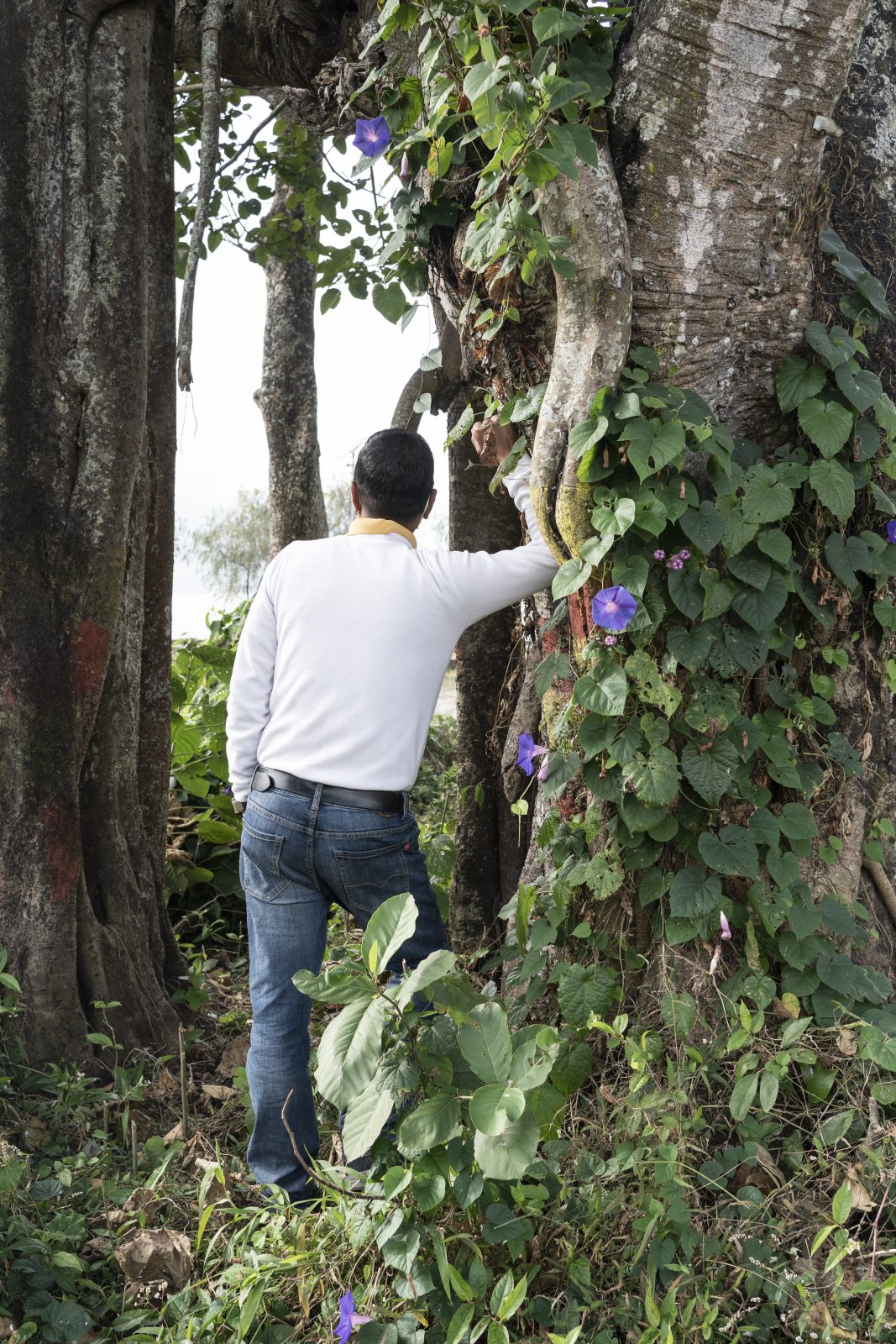
Dewa Gurung in Pokhora, Nepal November 2021.
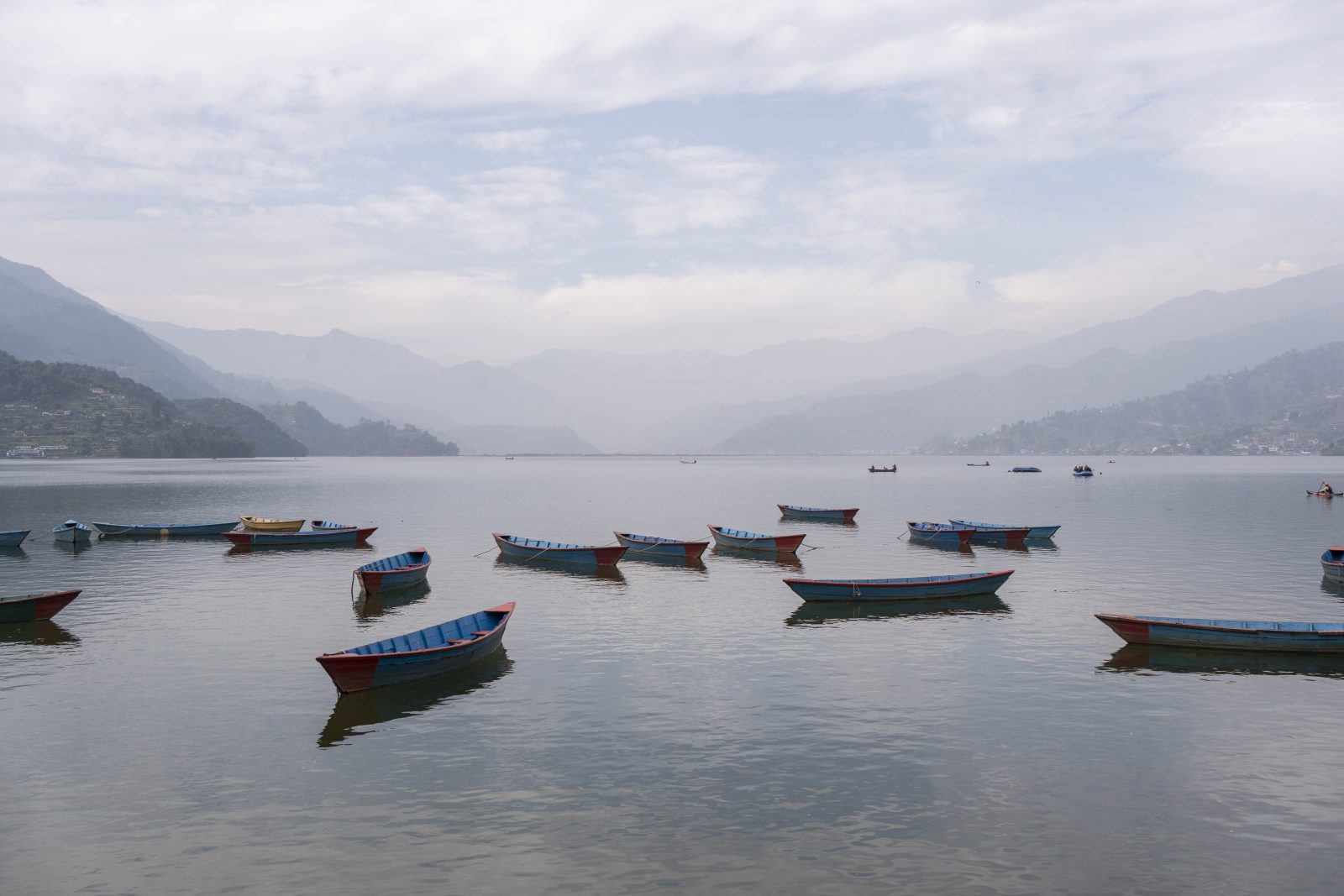
At the meeting at Pokhara’s Fewa Lake, Kumar Rana wishes to remain anonymous.
Gurung and Rana tell their stories separately. But the stories that connect them and the 32 others like them are nearly the same in every case. Their statements are, moreover, well-documented, as they were interviewed after seeking protection at the U.N. compound in Kabul.
It all started with an empty assurance: “I was promised a job in the Canadian, British or German embassy,” Gurung says. Gurung and Rana both served in the Indian army, each for more than 17 years. They are respectively in their late thirties and early forties. Each of them says an agent promised them a job. Both had an acquaintance who had previously been placed with the German Embassy through the same agent. The acquaintance confirms this, saying he too had paid money and then secured a job as a guard at the German Embassy in Kabul. Indeed, several of the 34 said in interviews that their agent had specifically promised that they would get a job at the German Embassy.
Gurung and Rana believed the agent and paid him. In March 2021, he sent them from Kathmandu to Dubai. There, they had to wait one month and pay $1,000 and then were given a tourist visa for Afghanistan. In April, they flew to Kabul. An Afghan agent picked them up at the airport and took them to the Roshan Plaza hotel and then took their passports.
The German Embassy in Kabul had outsourced its security services to Hart Security, a British company. Gurung identifies a Hart employee who interviewed them the day after they arrived. The interview lasted five minutes, Rana says. They were then told to wait until a job became available.
They had no passports. From March until August, they were trapped in the hotel. Because they were not working, the Afghan agent continued to demand money from their families back home, sometimes $800 at a time, sometimes as much as $1,500. Their wives had to borrow money. They were hostages now. In total, they both paid over $10,000 for the trip, scraped together by their relatives. Today, both of them are deep in debt.
Rana says only one of their group got a job as a security guard at UNHCR, the UN Refugee Agency. When Kabul fell, the embassies evacuated their staff and their security personnel. The Nepalese were left without jobs. Their agent blocked them on WhatsApp and Facebook. After they contacted the Nepalese embassy in Delhi, an evacuation attempt failed as crowds of other would-be escapees at Kabul’s airport prevented them from reaching the plane. In the end, they hid in the Sikh temple.
IDG chief Gordon says it is too easy to blame unscrupulous security firms. Or even the corrupt agents in Nepal, he adds. “The bad guys are the customers who don’t care about anything. Who look the other way, and don’t care how their staff is recruited.”
When contacted for a response, the German Federal Foreign Office writes that there is no evidence for the Gurkhas’ assertions but that they will be investigated. A representative confirms that the German Embassy in Kabul hired security personnel through the Hart company, noting that “the contract stipulated that personnel would have sufficient experience and qualifications.” In a separate statement, a Hart representative writes that the firm is surprised and shocked by the Gurkhas’ statements. This representative says the firm worked with a local agent in Kabul who took care of background checks and travel.
The 34 rescued Gurkhas stayed at the U.N. compound for two months. At one point, they participated in a volleyball tournament with the guards from IDG. “I keep thinking: What would have happened if I hadn’t been evacuated?” Gurung says. Gurung and Rana left Afghanistan without external wounds. Others were flown out on stretchers.
Barely surviving
Take, for instance, the 37-year-old former security guard Mahesh Thapa Magar (no relation to Ajit Fewali Magar, the trainee). At a meeting, he shows off a book that could have been the condolence book at his funeral, and indeed, he came very close to dying. On May 2, 2012, the Taliban attacked the Green Village compound, a secure housing complex for diplomats in Kabul. Mahesh Magar had just started his morning shift there, coffee in hand when the bomb exploded. The fragments slammed into him, lacerating his body. Gurkha guards defended the entrance gate against the Taliban for hours. When reinforcements arrived, an American soldier noticed that Mahesh Magar was still alive.
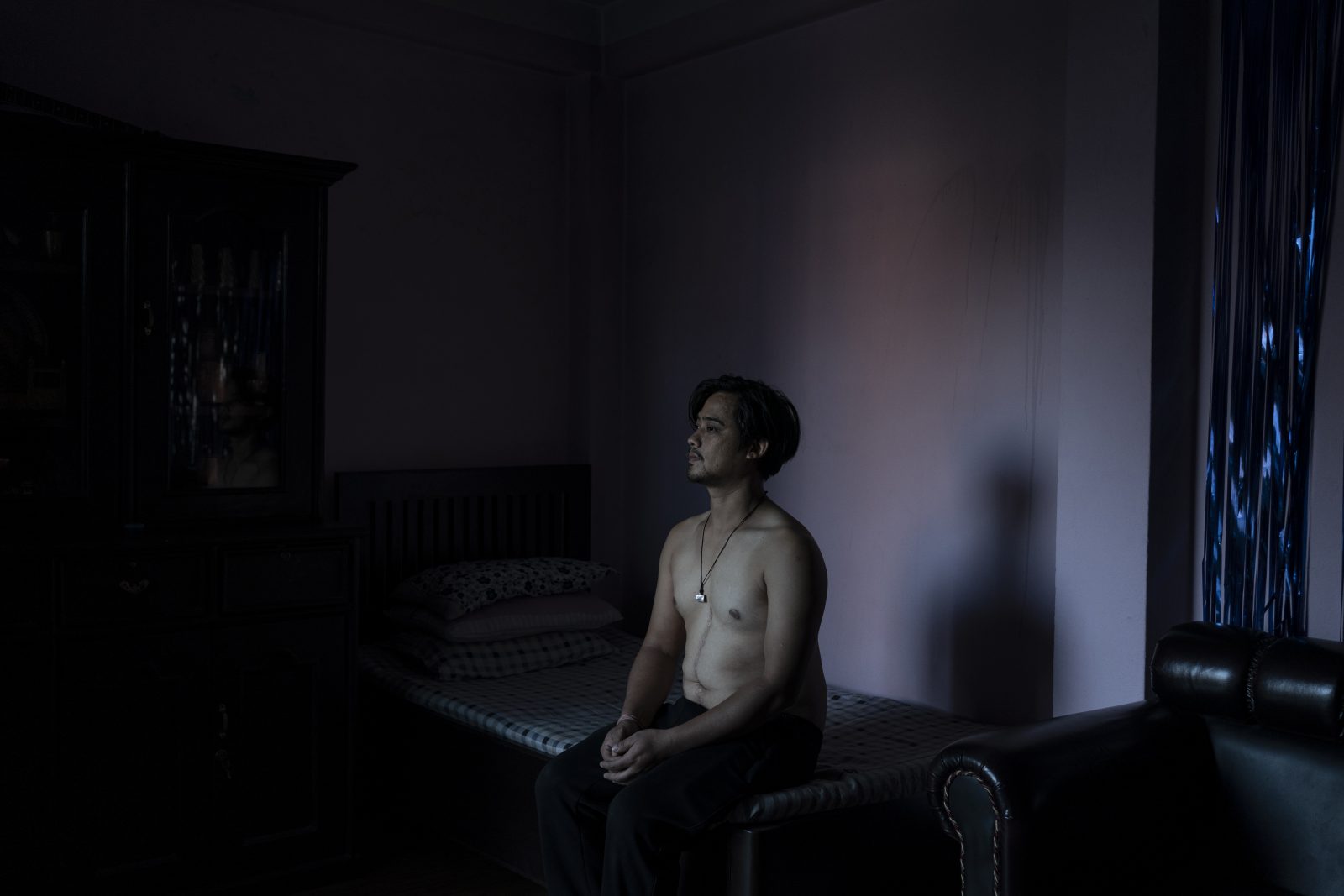
Mahesh Thapa Magar’s life was torn apart by a bomb in Kabul.
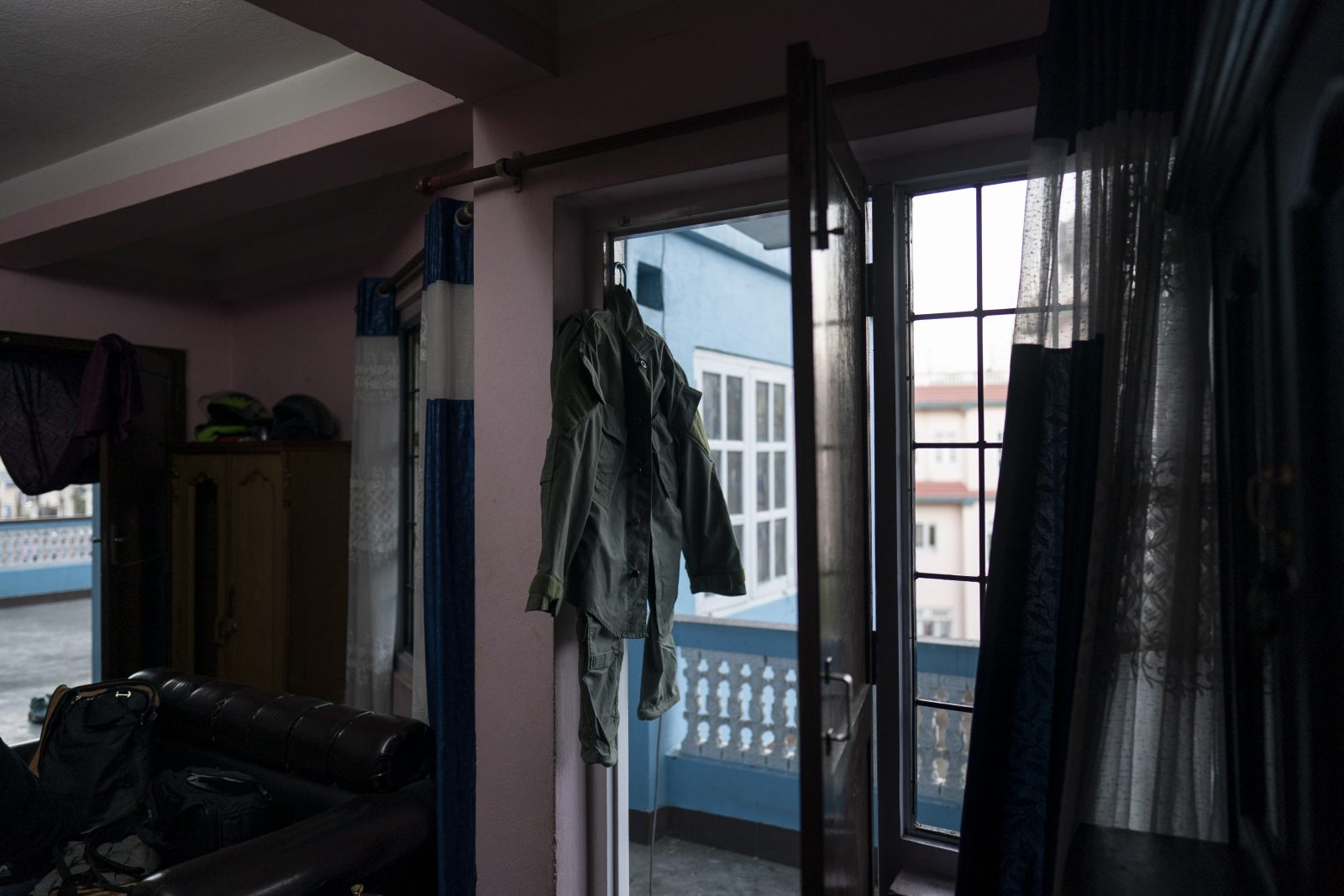
As a memento, Mahesh Magar keeps the uniform he wore as a guard in Afghanistan and hangs it in his Kathmandu apartment.
In the book, Green Village residents left messages of greeting. One wrote: “I am so sorry for the loss and injuries suffered by these brave men.: One of Mahesh Magar’s Gurkha colleagues died in the attack.
There are no figures for the number of dead or injured Gurkha guards in Afghanistan. Estimates have to be pieced together from reports. In 2012, 2013 and 2019, for example, attacks on the Green Village compound killed or wounded a total of nine Gurkhas. In 2011, four were killed in an attack on a U.N. building. In 2016, another 13 lost their lives when the Taliban attacked a bus full of Canadian embassy guards. The Nepalese victims are rarely mentioned in newspaper reports. Coburn, the American professor, estimates that at least 50 Nepalese guards ultimately perished in the country, but says he would not be surprised if the number was more than 200.
Mahesh Magar says he spent a year in the Nepalese army before an agent convinced him to enlist in Afghanistan: “I felt ready for the job.” A photo on the wall of his apartment depicts him before his departure, with his wife Tina Tamang and their young daughter. Tamang, 36, sits next to her husband today. She keeps running her hand through his hair, which at the time of the photo was black but now has grey streaks. When he cannot talk anymore, she takes over.
Mahesh Magar was wounded so badly that he could no longer work in Nepal, they say. In Afghanistan, he had been employed by Shield Security Service. The company paid for his medical treatment, and afterwards sent him payments of $1,000 a month. However, the payments stopped in 2015, three years after the attack. As Mahesh Magar had no direct contact with the company, he talked to his agent, who said the firm was having financial problems.
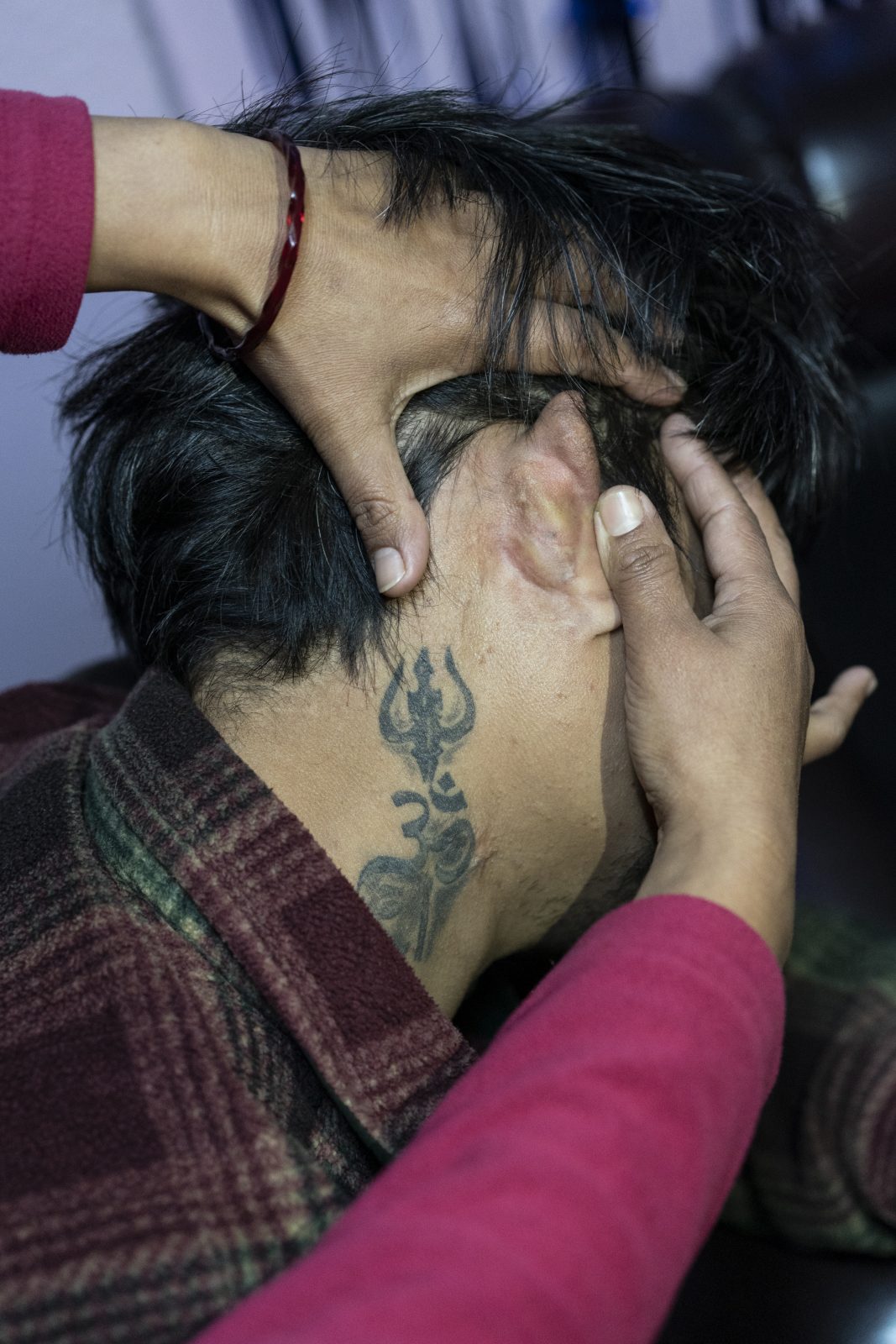
Mahesh Thapa Magar has the god Ganesh tattooed on his neck. In his cupboard, he keeps a kukri, the traditional knife of the Gurkhas.
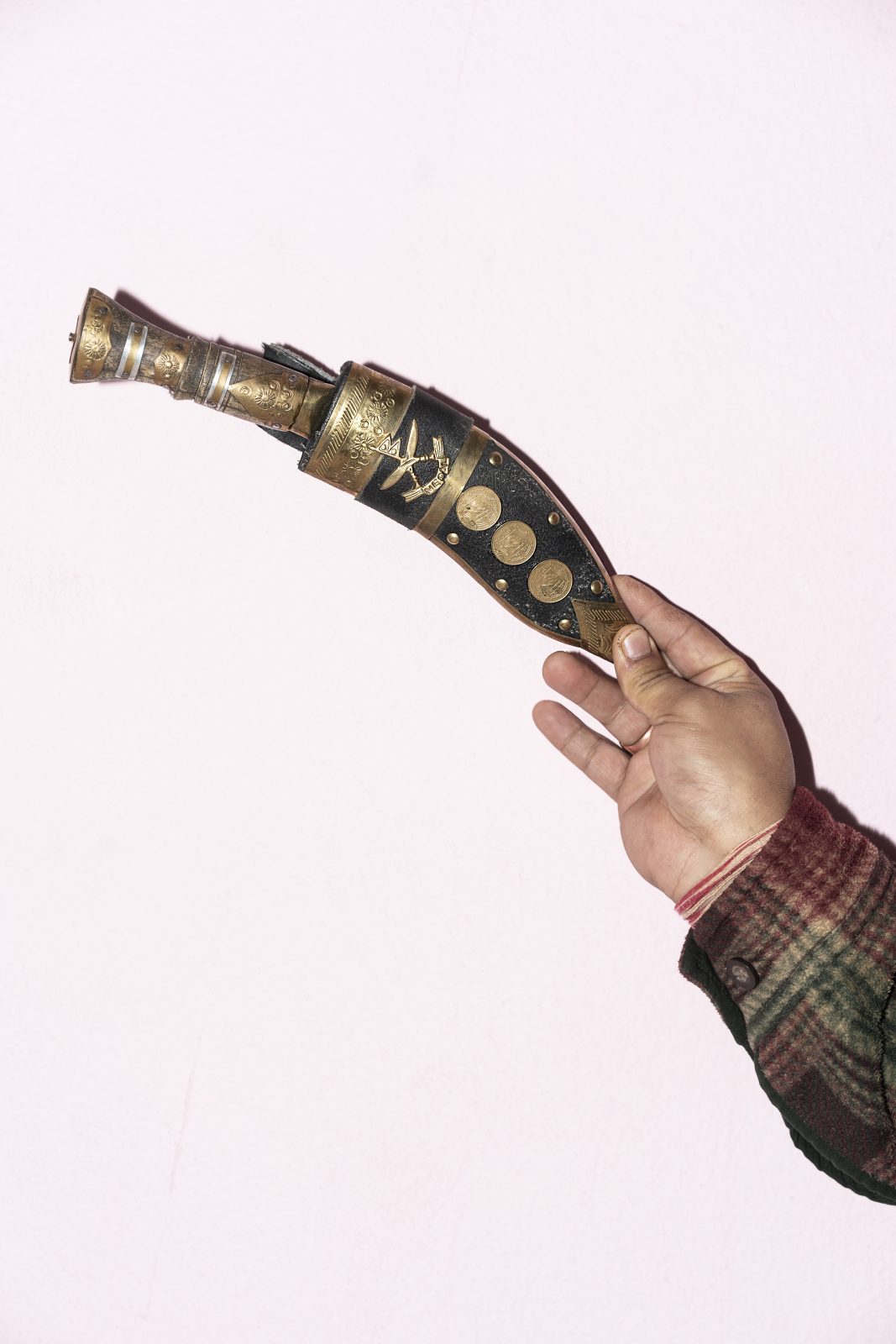
Mahesh Thapa Magar has the god Ganesh tattooed on his neck. In his cupboard, he keeps a kukri, the traditional knife of the Gurkhas.
In Afghanistan, companies like Shield wrap themselves in the Gurkhas’ reputation, marketing and selling the Nepalese to clients as elite soldiers even if, like Mahesh Magar, they have served for no more than a year. Among the Gurkhas, stories also circulate of cooks and taxi drivers who have become guards in Afghanistan through forged documents. If something goes wrong, these companies and agents simply slip away and the supposedly elite soldiers are left to fend for themselves. Mahesh Magar has hired a lawyer to try to identify someone from Shield so that they can be held accountable. This is proving to be a difficult undertaking.
Mahesh Magar says he has trouble sleeping. His wife runs a small cosmetics shop. Their daughter is now a teenager and would like to study but the family doesn’t have enough money. When Mahesh Magar can’t sleep, he climbs to the roof to think. But in the cold, the pain comes back. His wife says she is on antidepressants. She has not been able to talk to anyone. It’s as if the bomb sent a shock wave through time. Even 10 years later, they are still having difficulties getting back on their feet.
Gordon wants to sue
Ajit Fewali Magar, the aspiring Gurkha, ultimately failed to make it through the first round of recruitment to the Singapore Police Force. Gordon is considering joining the stranded Gurkhas in a lawsuit against Hart and other companies. The evacuation cost him $150,000 and the Nepalese government appears unlikely to reimburse him. Gurung and Rana want to go back to Afghanistan soon because they need money to pay off their debts. Both say they would not pay an agent again.
Nepal currently prohibits its nationals from travelling to Afghanistan. Nevertheless, back in Kabul the first Nepalese have already landed. Embassies have already requested bids for guard contracts.
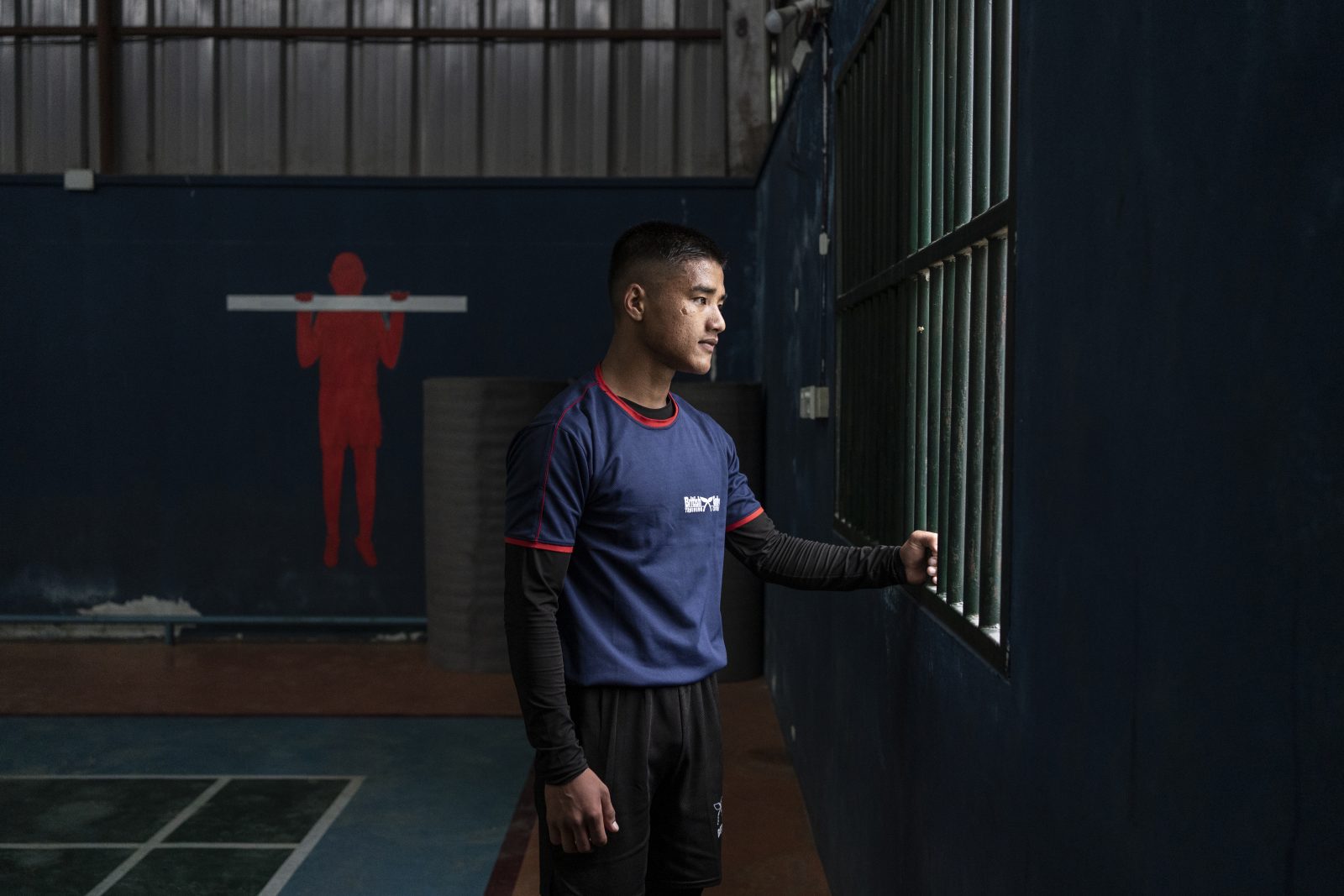
Ajit Fewali Magar didn’t make it to the Singapore Police Force. In the end, all the training wasn’t enough.

